英国文学基础知识
- 格式:doc
- 大小:49.50 KB
- 文档页数:4
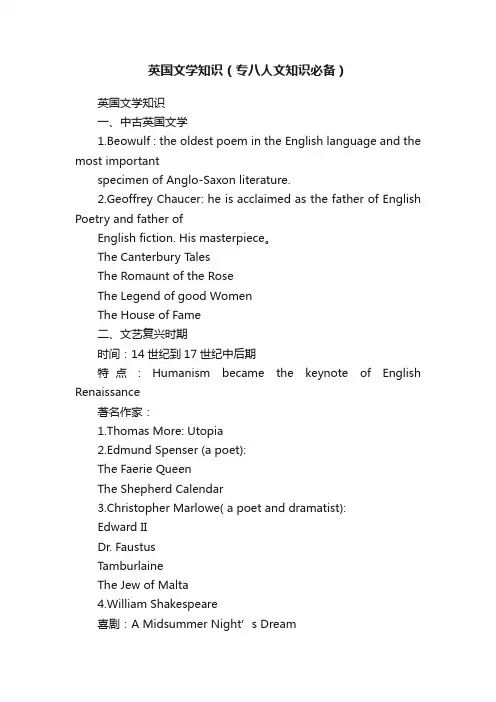
英国文学知识(专八人文知识必备)英国文学知识一、中古英国文学1.Beowulf : the oldest poem in the English language and the most importantspecimen of Anglo-Saxon literature.2.Geoffrey Chaucer: he is acclaimed as the father of English Poetry and father ofEnglish fiction. His masterpiece。
The Canterbury TalesThe Romaunt of the RoseThe Legend of good WomenThe House of Fame二、文艺复兴时期时间:14世纪到17世纪中后期特点:Humanism became the keynote of English Renaissance著名作家:1.Thomas More: Utopia2.Edmund Spenser (a poet):The Faerie QueenThe Shepherd Calendar3.Christopher Marlowe( a poet and dramatist):Edward IIDr. FaustusTamburlaineThe Jew of Malta4.William Shakespeare喜剧:A Midsummer Night’s DreamAs you like itMerchant of VeniceThe Twelfth night悲剧:Romeo and JulietThe Tempest四大悲剧:Othello, Macbeth, King Lear, Hamlet主要历史剧:Henry IV, Henry V5.Francis BaconEssaysThe advancement of learning6.John DonneThe Elegies and SatiresThe Songs and Sonnets7.John Milton (poet)晚年三首长诗Paradise lost, Paradise Regained, Samson Agonistes三:新古典主义时期时间:17世纪中后期到18世纪特点:The neoclassicists held that all forms of literature were to be modeled after the classical works of the ancient Greek and Roman writers. They believed that the artistic ideals should be order, logic and restrained emotion and accuracy.著名作家:1.John Dryden: All for Love2.John Bunyan: The Pilgrim’s ProgressThe Holy WarThe life and Death of Mr. Badman3.Alexander Pope An Essay on CriticismAn Essay on ManThe Rape of the LockOdyssey4.Daniel Defoe(who is called the father of English and European novels)Robison CrusoeA journal of the Plague yearCaptain Singleton5.Jonathan SwiftGulliver’s TravelA Tale of a TubA Modest proposalThe Drapier’s letters6.Henry FieldingThe History of Tom Jones, a Foundling7.Samuel Johnson (著名词汇家,第一部英语字典的编者)A Dictionary of the English LanguageThe Vanity of Human WishesLondon8.Richard Brinsley SheridanThe school for the scandalThe Rivals9.Thomas GrayElegy Written in a country churchyardOde on the spring四:浪漫主义时期时间:18世纪中期到19世纪中期特点:Romanticism gave primary concern to passion, emotion, and natural beauty and is marked by a strong reaction and protest against the bondage of rule and custom. The Romanticism period is an age of Poetry and poets.主要作家1.William BlakeSongs of ExperienceSongs of InnocencePoetical SketchesThe marriage of heaven and hell 2.William WordsworthLyrical BalladsTo the CuckooMy Heart leaps up3.Samuel Taylor Coleridge Kubla Khan 忽必烈汗三巨头1.George Gordon ByronCainDon JuanChilde Harold’s Pilgrimage2.Percy Bysshe ShelleyOde to the West WindOde to the Skylark Prometheus unboundedThe Necessity of Atheism Queen Mab3.John KeatsOde to AutumnOde to a nightingaleOde on a Grecian um 希腊古瓷颂Isabella以下各位不太重要:1.Charles LambTales from ShakespeareEssays of Elia2.Mary ShelleyFrankenstein3.Robert SoutheyJoan of Arc 圣女贞德小说家Jane AustinEmmaSense and SensibilityPride and PrejudiceMansfield ParkPersuasion五、VICTORIA PERIOD时间:维多利亚1837年继位,1901年去世。
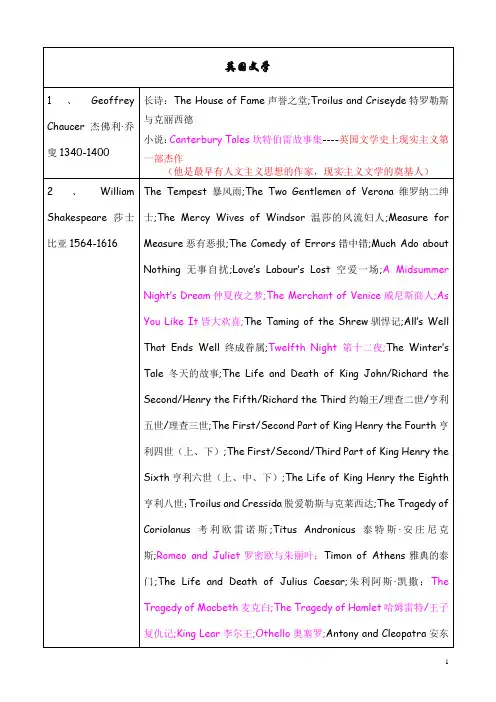
英国文学1、Geoffrey Chaucer杰佛利·乔叟1340-1400 长诗:The House of Fame声誉之堂;Troilus and Criseyde特罗勒斯与克丽西德小说:Canterbury Tales坎特伯雷故事集----英国文学史上现实主义第一部杰作(他是最早有人文主义思想的作家,现实主义文学的奠基人)2、William Shakespeare莎士比亚1564-1616 The Tempest暴风雨;The Two Gentlemen of Verona维罗纳二绅士;The Mercy Wives of Windsor温莎的风流妇人;Measure for Measure恶有恶报;The Comedy of Errors错中错;Much Ado about Nothing无事自扰;Love’s Labour’s Lost空爱一场;A Midsummer Night’s Dream仲夏夜之梦;The Merchant of Venice威尼斯商人;As You Like It皆大欢喜;The Taming of the Shrew驯悍记;All’s Well That Ends Well终成眷属;Twelfth Night第十二夜;The Winter’s Tale冬天的故事;The Life and Death of King John/Richard the Second/Henry the Fifth/Richard the Third约翰王/理查二世/亨利五世/理查三世;The First/Second Part of King Henry the Fourth亨利四世(上、下);The First/Second/Third Part of King Henry the Sixth亨利六世(上、中、下);The Life of King Henry the Eighth 亨利八世;Troilus and Cressida脱爱勒斯与克莱西达;The Tragedy of Coriolanus考利欧雷诺斯;Titus Andronicus泰特斯·安庄尼克斯;Romeo and Juliet罗密欧与朱丽叶;Timon of Athens雅典的泰门;The Life and Death of Julius Caesar;朱利阿斯·凯撒;The Tragedy of Macbeth麦克白;The Tragedy of Hamlet哈姆雷特/王子复仇记;King Lear李尔王;Othello奥塞罗;Antony and Cleopatra安东尼与克利欧佩特拉;Cymbeline辛白林;Pericles波里克利斯;Venus and Adonis维诺斯·阿都尼斯; Lucrece露克利斯;The Sonnets十四行诗3、Francis Bacon 培根1561-1626 Advancement of Learning学术的进展;Novum Organum新工具;New Atlantic新大西岛;Essays论文集(Of Studies论学习;Of Wisdom for a Man’s Self)4、John Milton约翰·弥尔顿1608-1674 L‘Allegro欢乐的人;Il Penseroso沉思的人;Comus科马斯;Lycidas列西达斯;Areopagitica论出版自由;Pro Populo Anglicano Defense为英国人民声辩; Pro Populo Anglicano Defense Secunda再为英国人民声辩;Paradise Lost失乐园;Paradise Regained复乐园;Samson Agonistes力士参孙5、John Bunyan班扬1628-1688 The Pilgrim’s Progress天路历程;The Life and Death of Mr Badman培德曼先生的一生6、Joseph Addison 艾迪生诗:The Campaign 远征;剧本:Cato加图名文;Adventure of A shilling一先令的历险7、Richard Steele 理查德·斯梯尔1672-1729 The Christian Hero基督教徒的英雄名文:The Spectator Club旁观者俱乐部8、Daniel Defoe丹尼尔·迪福1660-1731 (标志着近代英国小说的形成)Hymn to the Pillory枷刑颂;Robinson Crusoe鲁宾孙飘流记;Captain Singleton辛格顿船长;Moll Flanders莫尔弗兰德斯;A Journal of the Plague Year大疫年日记9、Jonathan Swift 斯威夫特1667-1745 The Battle of Books书的战争;A Tale of A Tub一个木桶的故事;The Drapier’s Letters布商的书信;A Modest Proposal一个温和的建议;Gulliver’s Travels格列佛游记(A Voyage to Lilliput/Brobdingnag/Laputa,Balnibarbi,Luggnagg,Glubbdubdriba and Japan/The Country of the Houyhnhnms小人国/大人国/拉普他等地/智马国游记)10、Alexander Pope蒲柏1688-1744 Pastorals田园诗集;An Essay on Criticism批评论;Windsor Forest 温莎林;The Rape of the Lock卷发遇劫记;The Duncical愚人志;Moral Essays道德论;An Essay on Man人论;Epistle to Dr Arbuthnot与阿布斯诺博士书11、Henry Fielding 亨利·菲尔丁1707-1754(英国现实主义小说的奠基者)剧本:The Coffeehouse Politician咖啡屋政客;Don Quixote in England堂·吉诃德在英国;The Historical Register for the Year历史记事长篇小说:The History of the Adventures of Joseph Andrews,and of His Friend Mr Abraham Adams约瑟·安德鲁传;The Life of Mr Jonathan Wild the Great大伟人江奈生·魏尔德传;The History of Tom Jones,a Foundling汤姆·琼斯;Amelia阿美利亚12、Samuel Johnson塞缪尔·约翰生1709-1784 A Dictionary of the English Language英语语言辞典;Lives of Poets 诗人传;Vanity of Human Wishes人类欲望的虚幻;Rasselas拉塞勒斯名文:Letter to Lord Chesterfield给吉士菲尔伯爵的信13、Oliver Goldsmith哥尔斯密1728-1774 The Vicar of Wakefield威克菲尔德牧师传;The Citizen of the World世界公民;The Deserted荒村;She Stoops to Conquer屈身求爱;The Rivals情敌;The School for Scandal造谣学校14、William Blake 布莱克1757-1827 Poetical Sketches素描诗集; Songs of Innocence天真之歌; Songs of Experience经验之歌; The French Revolution法国革命; The Marriage of Heaven and Hell天堂与地狱的婚姻;America;Milton;Jerusalem 名诗:London;The Tiger15、Robert Burns 彭斯1759-1796 Poems Chiefly in the Scottish Dialect苏格兰方言诗集名诗:The Tree of Liberty自由村;Scots Wha-Hae苏格兰人;The Two Dogs两只狗;Holy Willie’s Prayer威利长老的祈祷;My Heart’s in the Highlands我的心呀在高原;A Red,Red Rose一朵红红的玫瑰;John Anderson约翰·安德生,My Jo;A Man’s A Man for A’That不管身在何处都须保持尊严;Robert Bruce’s March to Bannockburn16、William Wordsworth威廉·华兹华斯1770-1850 An Evening Walk黄昏漫步;Lyrical Ballads抒情歌谣集(与柯勒律治合编);Lucy Poems露西组诗(She Dwelt Among the Untrodden Ways;To the Cuckoo杜鹃颂;I Wandered Lonely as a Cloud;The Solitary Reaper孤寂的刈麦人);Ode on Intimations of Immorality 不朽颂;Ode to Duty义务颂;The Excursion远足;The Prelude序曲17、Samuel Taylor Coleridge柯勒律治1772-1834 Lyrical Ballads;The Fall of the Bastille巴士底狱的毁灭;The Rime of the Ancient Mariner老船夫;Kubla Khan忽必烈汗;Biographia Literaria文学传记18、Walter Scott 瓦尔特·司各特1771-1832 诗:The Minstrelsy of the Scottish Border苏格兰边区歌谣集;Marimion玛里恩;The Lady of the Lake湖上夫人小说:Waverley威弗利;Guy Mannering盖·曼纳令;Rob Roy罗布罗伊;The Heart of Midlothian米德洛西恩监狱;Ivanhoe艾凡赫;Kenilworth坎尼尔华斯;Woodstock皇家猎馆;Quentin Durward昆廷·达沃19、Jane Austin Pride and Prejudice傲慢与偏见;Sense and Sensibility理智与情简·奥斯丁1775-1817 感;Emma爱玛;Mansfield Park曼斯菲尔德公园;Persuasion好事多磨; Northanger Abbey诺桑觉寺20、Charles Lamb 查尔斯·兰姆1775-1834 Tales from Shakespeare莎士比亚故事集;Alburn Verses诗集;Essay of Elia伊利亚散文集(Dream Children梦中儿女;A Dissertation unpon Roast Pig烤猪论;Old China古瓷;New Year’s Eve除夕;The Praise of Chimney Sweepers扫烟囱童工赞;The Superannuated Man领取养老金的人;A Bachelor’s Complaint of the Behavior of Married People单身汉对结过婚的人的行为的抱怨)21、William Hazlitt 威廉·赫兹里特1778-1830 Characters of Shakespeare’s Plays莎剧中的人物;A View of the English Stage英国舞台一瞥;Lecture on the English Poets论英国诗人;The Spirit of the Age时代精神;Sketches and Essays素描与随笔;Table Talk桌边文谈名文:On Familiar Style22、George Gordon Byron乔治·拜伦1788-1824 Hours of Idleness懒散的时刻;English Bords and Scottish Reviewers英国诗人与苏格兰评论家;Childe Harold’s Pilgrimage,Cantos I and II,Canto III 1818恰罗德·哈罗德游记;Ode to the Framers of the Frame-bill编织机法案编制者颂;Oriental Tales东方叙事诗(The Bride of Abydos阿比道斯的新娘;The Corsa 海盗;The Siege of Corinth柯林斯之围);Manfred曼弗雷德;The Age of Bronze青铜世纪;Don Juan唐·璜名诗:She Walks in Beauty;The Isles of Greece23、Percy Bysshe Shelley波西·比Queen Mab麦布女王;Prometheus Unbound解放了的普罗米修斯;Adonais阿东尼斯;The Cenci钦契;Song to the Men of England致希·雪莱1792-1822 英国人民;England in 1819;The Masque of Anarchy专制魔王的化装游行;Ode to the West Wind/a Skylark西风/云雀颂;A Defence ofPoetry诗辩24、John Keats约翰·济兹1795-1821 Endymion恩底弥翁;Isabella伊莎贝拉;The Eve of Sanit Agnes圣爱尼节前夜;Ode on a Grecian Urn希腊古瓮颂;Ode to a Nightingale夜莺颂;To Autumn秋颂;Hyperion赫披里昂(未完成)25、Thomas Hood 胡德1799-1845 The Song of the Shirt衬衫之歌;The Bridge of Sighs悲叹之桥;Miss Kilmansegg and Her Precious Leg基尔曼塞格小姐和她贵重的腿26、Ernest Jones 琼斯1819-1869 小说:The Women’s Wrongs妇女们的委屈名诗:The Song of the Lower Class;The Song of the Future27、Afred Tennyson丁尼生1809-1892 Poems of Two Brothers壎篪;Timbuctoo提姆巴克图;The Princess 公主;In Memorial H H悼念哈拉姆;Maud毛黛;Enoch Arden伊诺克·阿登;Idylls of the King国王之歌名诗:Ulysses;The Eagle;Break,Break,Break28、Robert Browning 勃朗宁1812-1889 Paracelsus巴拉塞尔士;Strafford斯特拉福;Pippa Passes比芭走过;Dramatic Lyrics戏剧抒情诗;Dramatic Romances and Lyrics戏剧传奇与抒情诗(Home Thoughts;From Abroad; Prospice向前看);Dramatic Personae登场人物;Men and Women男男女女29、Elizabeth Barrel Browning勃朗宁1806-1861 Sonnets from the Portuguese葡萄牙十四行诗;The Cry of the Children30、Charles Dickens狄更斯The Posthumous Papers of the Pickwick Club匹克威克外传;Oliver Twist奥利弗·退斯特;American Notes美国札记;Martin Chuzzlewit1812-1870 马丁·朱述尔维特;The Old Curiosity Shop老古玩店;Dombey and Son 董贝父子;David Copperfield大卫·科波菲尔;Hard Times艰难时世;ATale of Two Cities双城记;Great Expectation远大前程31、William Makepeace Thackery萨克雷1811-1863 The Book of Snobs势利者集;Vanity Fair名利场;History of Pendennis潘丹尼斯的历史;The History of Henry Esmond亨利·艾斯芒的历史;The Newcomes纽可谟一家;The Virginians弗吉尼亚人32、Elizabeth Cleghorn Gaskell 盖斯凯尔1810-1865 Mary Barton玛丽·巴顿;Ruth露斯;Cranford克兰弗德;North and South北与南;Life of Charlote Bronte夏洛蒂勃郎特传33、Charlotte/Emily/A nne Bronte夏洛蒂/爱米丽/安妮·勃郎特1816-1855 Jane Eyre简爱【夏洛蒂·勃朗特(Charlotte Bronte)】Shirley雪丽Wuthering Height呼啸山庄[ 艾米丽.勃朗特Emily Bronte] Agones Grey艾格尼斯·格雷【Anne Bronte安妮·勃郎特】34、George Eliot 爱略特1819-1880 Adam Bede亚当·贝德;The Mill on the Floss弗洛斯河上的磨坊;Silas Marner织工马南;Middlemarch米德尔马契;Felix Holt,the Radical35、Thomas Carlyle卡莱尔1795-1881 Sartor Resartus衣裳哲学/旧衣新裁;The Life of Schiller席勒传;The French Revolution;Heroes and Hero-worship论英雄与英雄崇拜36、George Meredith梅瑞狄斯诗:Modern Love;Poems and Lyrics of the Joy of Earth大地欢歌小说:The Ordeal of Richard Feverel理查德·法弗尔的考验;The1828-1909 Egoist利己主义者;Diana of the Crossway彷徨中的戴安娜;The Idea of Comedy and the Uses of the Comic Spirit喜剧的概念与喜剧精神的作用37、William Morris 莫里斯1834-1896 诗:The Earthly Paradise地上乐园;Chants of Socialism社会主义歌集;Pilgrims of Hope希望的探求者小说:A Dream of John Ball梦见给翰·保尔;News from Nowhere乌有乡消息38、Samuel Butler 勃特勒1835-1902 The Way of All Flesh如此人生;Erewhon埃瑞璜;Erewhon Revisited 重游埃瑞璜39、Thomas Hardy 哈代1840-1928 Under the Greenwood Tree绿茵下;Far from the Madding Crowd 远离尘嚣;The Return of the Native还乡;The Mayor of Casterbridge卡斯特桥市长;Tess of the D’urbervilles德伯家的苔丝; Jude the Obscure无名的裘德诗集:Wessex Poems 威塞克斯诗集史诗剧:The Dynasts统治者三部曲40、Robert Couis Stevenson史蒂文生1850-1894 小说:New Arabian Nights新天方夜谭;Treasure Island宝岛;The Strange Case of Dr Jeykell and Mr Hyde化身博士;Kidnapped诱拐游记:An Inland Voyage内陆游记;Travels with a Donkey in the Cevennes骑驴旅行;A Child’s Garden of Verses儿童诗园41、Isabella Augusta Gregory/Perse格葛瑞/珀斯1852-1932 The Traveling Man旅行者;Spreading the News道听途说;Hyachinth Halvey海钦斯·哈尔威;The Gaol Gate监牢之门;The Rising of the Moon月亮上升的时候42、Oscar Wilde 王尔德1856-1900 长篇小说:The Picture of Dorian Gray道林·格雷的画像童话:The Happy Prince and Other Tales快乐王子诗集:De Prafundis惨痛的呼声;The Ballad of Reading Gaol累丁狱之歌剧作:Lady Windermere’s Fan温德米尔夫人的扇子;A Woman of No Importance一个无足轻重的妇女;An Ideal Husband理想丈夫;The Importance of Being Earnest埃耐斯特的重要性43、George Bernard Shaw萧伯纳1856-1950 长篇小说:An Unsocial Socialist业余社会主义者评论:Quintessence of Ibsenism剧本:Widoer’s Houses鳏夫的房产;Mrs Warren’s Profession华伦夫人的职业The Devil’s Disciple魔鬼的门徒;Man and Superman人与超人;John Bull’s Other Island英国佬的另一个岛;Major Barbara巴巴拉少校;Pygmalion劈克美梁;Heartbreak House伤心之家;The Apple Cart苹果车;Too True to be Good真相毕露44、George Gissing 吉辛1857-1903 小说:Demos民众;New Crub Srreet新穷士街;Born in Eile在流放中诞生;The Private Papers of Henry Ryecroft拉伊克罗夫特的日记(散文);Charles Dickens:A Critical Study狄更斯研究45、Joseph Conrad 康拉德1859-1924 长篇小说:Almayer’s Folly奥尔迈耶的愚蠢;The Nigger of the Narcissus水仙号上的黑鬼;Lord Jim吉姆老爷;Nostromo诺斯特罗莫;The Secret Agent间谍;Chance机缘;Victory胜利短篇小说:An Outpost of Progress文明的前哨;Heart of Darkness 黑暗的中心;Youth青春46、Joseph 诗集:Barrak Room Ballad营房诗集;The Seven Seas七海;RecessionRudyard Kipling罗德雅德·吉卜林1865-1936 and Other Poems赞美诗及其他;The Five Nations五国长篇小说:Kim基姆;Captain Courageous勇敢的船长短篇小说:Plain Tales from the Hills;Soldiers There;The Story of the Gadsby;Life Handcap生命的阻力;The Jungle Book;The Second Jungle Book林莽之书;The Lost Legion47、William Butler Yeats叶芝1865-1939 诗:Respondibilities责任;The Tower塔;The Winding Stair盘旋的楼梯名诗:A Deap Sworn Vow;Easter 1916剧本:The Land of Heart’s Desire理想的国土;The Hour Glass时漏;Dedidre黛德尔Autobiographies自传三部曲;Essays and Introduction48、Herbert George Wells威尔斯1866-1946 科幻小说:The Time Machine时间机器;The Island of Dr Morau莫洛博士岛;The Invisible Man隐身人;When the Sleeper Waked;The Shape of Things to Come未来事物的面貌An Outline of World Histrory 世界史纲社会生活小说:Tono Bungay托诺·班格;Ann Veronica安·维罗尼卡;Kipps基普斯49、Enoch Arnord Bennett阿诺德·本涅特1867-1931 A Man from the North北方人;Anna of the Five Towns五镇上的安娜;The Old Wives’ Tale老妇谭;Clayhanger克莱亨厄剧本:Milestones;How to Live Twenty-four Hours a Day50、John Galworthy高尔斯华绥1867-1933 From the Four Winds天涯海角(The Man of Property有产业的人;In Chancery骑虎难下;To Let出租→The Forsyte Saga福尔塞世家);(The White Monkey白猿;The Silver Spoon银匙;Swan Song天鹅曲→AModern Comedy现代喜剧)剧作:The Silver Box银匣;Strife斗争51、Saki萨奇(Hector Hugh Munro孟柔)1870-1916 短篇小说集:Reginald雷金纳德;Reginald in Russia;The Chronicles of Clovis克洛维斯记事;Beats and Super-beats;The Toys of Peace;The Square Egg方蛋名文:Dusk52、Edward Morgan Forster福斯特1879-1970 长篇小说:Where Angels Fear to Tread天使们忘而却步的地方;The Longest Journey最漫长的旅程;A Room with a View可以远眺的地方;A Passage to India印度之行短篇小说集:The Eternal Moment永恒的时刻散文集:Abinger Harvest在阿宾格村的收获;Two Cheers for Democracy53、John Millington Synge 沁孤1871-1909 The Playboy of the Western World西方世界的花花公子;Riders to the Sea骑马下海的人们;Deridre of Sorrows悲伤的黛达尔;In the Shade of the Glen在幽谷的阴影下;The Tinker’s Wedding补锅匠的婚礼54、Bertrand Russell罗素1872-1970 Road to Freedom到自由之路;Marriage and Morals婚姻与自由;Mysticism and Logic神秘主义与逻辑;Sceptical Essays怀疑论集;The Analysis of Mind心理分析;History of Western Philosophy 西方哲学史;Priccipia Mathematica数学原理;A Free Man’s Worship 短篇小说:Satan in the Suburbs撒旦在郊区;Portraits from Memory 回忆中的画像55、William Somerset 小说:Liza of Lambeth兰贝思的莉莎;Of Human Bondage人类枷锁;Cakes and Ale寻欢作乐;The Moon and Six Pence月亮与六便士Maugham毛姆1874-1965 短篇小说:Complete Short Stories短篇小说集剧本:Smith ;The Circle;Our Betters位居我们之上的人们56、John Masefield梅斯菲尔德1878-1967 诗:Salt-Water Ballads海上歌谣;The Everlasting Mercy永久的仁慈;The Widow in the Bye Street小街的寡妇;The Daffodil Fields 水仙田;Reynard the Fox狐狸雷纳德小说:Captain Margaret;Multitude and Solitude群与独;Sard Harker萨德·哈克尔剧本:The Locked Chest57、Giles Lytton Strachey斯特雷奇1880-1932 传记:Emiment Victorians维多利亚时代的杰出人物;Queen Victoria 评论集:Land-marks in French Literature;Books and Characters58、Sean O’casey 肖恩·奥凯西1880-1964 剧本:The Shadow of a Gunman枪手的影子;Juno and the Peacock 裘诺与孔雀;The Plough and the Stars犁与星;The Star TurnsRed;Red Roses for Me给我红玫瑰自传体小说:I Knock at the Door我敲门;Pictures in the Hallway门厅里的图画;Drums under Windows窗下鼓声;Inishfallen,Fare TheeWell英尼希法伦,再见;Rose and Crown;Sunset and Evening Star日落与金星59、James Joyce 乔伊斯1882-1941 短篇小说:Dubliners都柏林人长篇小说:A Portrait of the Artist as a Young Man青年艺术家的画像;Ulysses尤利西斯;Finnegan's Wake芬尼根的觉醒60、Virginia Woolf 沃尔芙1882-1941 长篇小说:Mrs Dalloway达洛威夫人;To the Lighthouse到灯塔去;Orlando奥兰多传;The Waves浪;Flush弗乐希;Between the Acts 幕间散文集:The Common Readers;The Death of the Moth and Other Ess ays;A Room of One’s Own;Three Guineas三个基尼亚名文:Modern Fiction现代小说日记:A Writer’s Diary61、David Herbert Lawrence劳伦斯1885-1930 The White Peacock白孔雀;Sons and Lovers儿子与情人;The Rainbow虹;Women in Love恋爱中的妇女;Lady Chatterley’s Lover 查泰莱夫人的情人62、Katherine Mansfield曼斯菲尔德1888-1923 In a German Pension在一个德国公寓里;Blis幸福;The Garden Party 园会;The Dove’s Nest鸽巢;Something Childish幼稚集63、Thomas Stearns Eliot艾略特1888-1965 诗集:Prufrock and Other Observation普鲁夫洛克及其他;The Waste Land荒原;The Hollow Men空虚的人们;Ash-Wednesday圣灰星期三;Four Quarters诗剧:Murder in the Cathedral大教堂里的谋杀案;The Family Reunion团圆评论集:The Sacred Wood圣林;Homage to John Dryden向约翰·德莱顿致敬;For Lancelot Andrews纪念兰斯洛特·安德鲁斯64、Aldous Leonard Huxley赫胥黎1894-1963 Antic Hay滑稽的环舞;Point Counter Point旋律和对立;Brave New World新奇的世界;Letters书信集;Ape and Essence猿与本质;Eyeless in Gaza加沙的盲人;After Many a Summer多少个夏天之后;The Doors of Perception感觉之门;Fairy Godmother天使教母(←Two or Three Graces雅事二三)65、John Boynton Priesley普里斯特小说:The English Comic Characters英国喜剧从物;The English Novel英国小说;The Good Companions好伙伴;Angel Pavement天使利1899- 街;They Walk in the City;他们走在城市中;Let the People Sing让人们歌唱剧本:Dangerous Corner危险的转角;Time and the Conways时代与康威一家;In Inspector Calls罪恶之家;When We Are Married;TheLinden Tree普提树;Summer Day’s Dream夏日梦66、Hugh MacDiarmid麦克迪尔米德1892-1978 Sangshaw诗歌集;A Drunk Man Looks at the Thistle醉汉看蓟;First/Second/Third Hymn to Lenin;In Memoriam James Joyce 悼念乔伊斯;Collected Poems名诗:Why I Choose Red;Moonlight Among;The Pines;Third Hymn to Lenin67、Ivor Armstrong Richards理查兹1893-1979 Principles of Literary Criticism文学批评原理;Science and Poetry;Practical Criticism实用批评;Coleidge on Imagination柯尔律治论想象;The Philosophy of Rhetoric修辞哲学;Basic in Teaching :East and West教学基础(The Four Kinds of Meaning);Basic English and It’s Uses基础英语及其应用68、Leshe Poles Hartley哈特利1895-1972 短篇小说集:Night Fears and Other Stories黑夜的恐惧及其他故事(The Killing Bottle致命瓶;The White Wand白色魔杖) 论文集:The Novelist’s Responsibility长篇小说:Eustace and Hilda优斯塔斯与希尔达三部曲(The Shrimp and the Anemone虾与海葵);The Go-Between信使;The Hireling佣工;Facial Justice表面正义;The Boat;A Perfect Woman一个完美的女人;The Betrayal背叛;My Sister’s Keeper妹妹的监护人69、Elizabeth The Hotel旅舍;The House in Paris巴黎寓所;The Death of theBowen鲍恩1899-1973 Heart心死;The Heat of the Day炎日短篇小说集:Look at All Those Roses(Tears ,Idle Tears)70、Victor Sawdon Pritchett普里彻特1900- 短篇小说:The Sailor水手;The Sense of Humour幽默感;Mr Beluncle贝伦克尔先生游记:The Spanish Temper西班牙性格评论集:Books in General 书籍泛谈自传:A Cab at the Door:A Memoir马车在家门口:回忆录;Midnight Oil挑灯夜谈71、George Orwell 奥威尔1903-1950 小说:Down and Out in Paris and London巴黎伦敦落魄记;Homage to Catalonia向坎塔罗尼亚致敬;Animal Farm兽园;Nineteen Eighty-Four散文集:Dickens,Dali and Others狄更斯,达里及其他;Shooting on Elephant and Other Essays猎象记及其他;The Collected Essays,Journalism and Letters of George Orwell in Four Volumes 奥威尔散文,新闻写作及书信集名文:Lear Tolstoy and The Fool72、Frank O’connor 奥康纳1903-1966 论文集:The Lonely Voice:A Study of the Short Story寂寞之声:短篇小说研究自传:An Only Son独生子;My Father’s Son;The Backward Look:A Survey of Irish Literature爱尔兰文学回顾短篇小说集:Collection Two:Stories by Frank O’connor(Private Property私有财产)73、Evelyn Waugh 伊夫林·沃长篇小说:Decline and Fall没落与堕落;Vile Bodies行尸走肉;A Handful of Dust 一撮灰尘;Black Mischief黑色的祸害;Scoop挖新1903-1966 闻;Put out More Flags多升几面旗;Bridgeshead Revisited重游布赖兹海德(Men at Arms行伍生涯;Officers and Gentlemen军官与绅士;Unconditional Surrender无条件投降→The Sword of Honour荣誉之剑三部曲)自传:A Little Learning一点学问(三部只成一部)短篇小说集:Mr Loveday’s Little Outing and Other Sad Stories洛弗戴先生一次短暂的外出与其他悲惨故事74、Christopher Isherwood 衣修午德1904- All the Conspirators所有的阴谋者;Mr Norris Changeds Traits诺里斯先生换火车;Sally Bowles萨利·鲍尔斯(选自《再见吧,柏林》);Journey to a War战地行;Prater Violet紫罗兰姑娘;The World in the Evening夜晚的世界;Down there on A Visit在那儿进行访问;A Single Man单身汉;A Meeting by the River河畔相会75、Graham Greene格雷厄姆·格林1904- 消遣:Stamboul Train斯坦布尔列车;A Gun for Sale一支出卖的枪;Our Man in Havana我们在哈瓦纳的人严肃:The Power and the Glory权力与荣誉;The Heart of the Matter问题的核心;The End of the Affair爱情的结局;The Quiet American;The Comedians喜剧演员;The Human Favor人的因素76、Charles Percy Snow斯诺1905-1980 Strangers and Brothers陌生人与兄弟们;The Light and the Dark光明与黑暗;Time of Hope希望的时刻;The Masters院长们;The New Men新人;Homecoings归家;The Conscience of the Rich富人的良心;The Affairs事件;Corridors of Power权力走廊;The Sleep of Reason理智沉眠;Last Things结局77、Peter Byron:The Year of Fame拜伦:盛名时期;Byron in Italy;Byron:ACourtney Quennell 昆纳尔1905- Self-Portrait拜伦:一幅自我画像;A History of English Literature;Four Portraits:Studies of the 18th Century四幅画像:关于十八世纪的研究78、William Empson燕卜荪1906- 诗集:Poems;The Gathering Storm酝酿中的风暴;Collected Poems 名诗:Legal Fiction;Homage to the British Museum论著:Seven Types of Ambiguity晦涩的七种类型;Some Versions of Pastoral田园诗的几种变化;The Structure of Complex Words复合词的结构79、Wystan Hugh Auden奥登1907-1973 诗集:Poems;The Orators雄辩家;Look,Stranger!瞧,陌生人;Spain 诗剧:The Dog Beneath the Skin皮下之狗;The Ascent,F6攀登F6;On the Frontier边界上The Sea and the Mirror海与镜;The Age of Anxiety忧虑时代;The Shield of Achilles阿基琉斯的盾牌;Homage to Clio向克奥女神致敬;About the House屋子内外散文评论集:The Dyer’s Hand染工之手;Secondary World次要的世界名诗:Who’s Who;The Unknown Citizen;Their Lonely Betters80、William Golding戈尔丁1911- 长篇小说:Lord of the Flies蝇王;The Inheritors继承人;Pincher Martin平却·马丁;The Spire塔尖;The Pyramid金字塔81、Angus Wilson 威尔逊1913- 小说:The Wrong Set and Other Storie乱了套和其他短篇故事s;Anglo-Saxon Attitudes盎格鲁撒克逊态度;The Middle Age of Mrs Eliot艾略特夫人的中年;The Old Men at the Zoo; Late Call夜访;As if by Magic象是用了魔术评论:Emile Zole爱弥尔·佐拉;The World of Charles Dickens;The Strange Ride of Rudyard Kipling吉卜林的奇异旅程82、Dylon Thomas 迪伦·托马斯1914-1953 诗:Eighteen Poems;The Map of Love爱的地图;Deaths and Entrances死亡与出场;Collected Poems自传:Portrait of the Artist as a Young Dog作为一条小狗的艺术家画像广播剧:Under the Milk Wood 名诗:Do Not Go Gentle Into That Good Night83、Muriel Sarah Spark斯帕克1918- The Comforter安慰者;The Prime of Miss Jean Brodie琼·布罗迪小姐的黄金时代;The Diver’s Seat司机的座位;The Abbess of Crewe 克鲁女修道院院长;Loitering with Intent存心游戏;Collected Stories I短篇小说集(一)84、Richard Lessing多丽丝·莱辛1919- The Grass is Singing草儿在歌唱;Children of Violence暴力和孩子们(Martha Quest玛莎·金奎特;A Proper Marriage正当的婚姻;A Ripple from the Storm暴风雨掀起的涟漪;Landlocked被陆地围住的;The Four-gated City四门城);The Golden Notebook金色笔记;Briefing for a Descent into Hell堕入地狱简况;The Summer before the Dark85、Iris Murdoch 默多克1919- Under the Net在网下;The Bel钟l;A Severed Head砍掉的头;The Black Prince黑衣王子;The Sea,The Sea大海啊,大海86、Philip Larkin 拉金1922- 诗:The North Ship北方船;Jill;A Girl in Winter诗集:The Less Deceived受骗较少的人;The Whitsun Weddings降灵节婚礼;High Windows高窗名诗:Church Going;Reason for Attendance87、Kingsley Amis 金斯莱·艾米斯1922- 小说:Lucky Jim幸运的吉姆;My Enemy’s Enemy我的敌人的敌人;One Fat Englishman一个英国胖子;That Uncertain Feeling那种不安感;Take a Girl Like You爱你这样的姑娘;Ending up死88、John Wain韦恩1925- 长篇小说:Hurry on Down大学后的漂泊;Living in the Present生活在当代;The Contenders竞争者;Strike the Father Dead打死父亲;A Winter in the Hills山中寒冬短篇小说集:The Life Guard救生员89、Brian Wilson Aldiss奥尔迪斯1925- The Brightfountain Diaries明泉日记; The Billion Year Spree:The History of Science Fiction科幻小说史;Best SF Stories of Brian W Aldiss奥尔迪斯最佳科幻故事集(Outside外界)90、Alan Sillitoe 西利托1928- Saturday Night and Sunday Morning;The General;Key to the Door;A Tree on Fire;A Start in Life一位长跑运动员的孤独;The Loneliness of the Long-Distance Runner捡破烂人的女儿;The Ragman’s Daughter;The Windower’s S on91、John Osborne 奥斯本1929- Look back in Anger愤怒的回顾;Lurther;Inadmissible Evidence不能接受的证据;Time Present and Hotel in Amsterdam目前和阿姆斯特丹的旅馆92、Ted Hughs特德·休斯1930- The Hawk in the Rain雨中鹰;Lupercal卢泼卡尔神(Hawk of Roosting);Scapegoats and Rabies替罪羊与狂犬病;Wodwo沃德沃怪物;Crow乌鸦Songs of Woe哀歌93、Arnold 剧本:The Wesker Triology韦斯克三部曲(Chicken Soup with BarleyWesker韦斯克1932- 大麦鸡汤;Roots;I’m Talking about Jerusalem0;The Four Seasons;The Friends;The Journalists新闻记者;Caritas Christi卡里塔斯·克里斯蒂94、Margaret Drabble德雷伯尔1939- 小说:A Summer Bird-cage夏日的鸟笼;The Garrick Year茄立克年;The Millstone磨石;The Needle’s Eye针眼;The Realms of Gold 黄金世界;The Ice Age冰期。
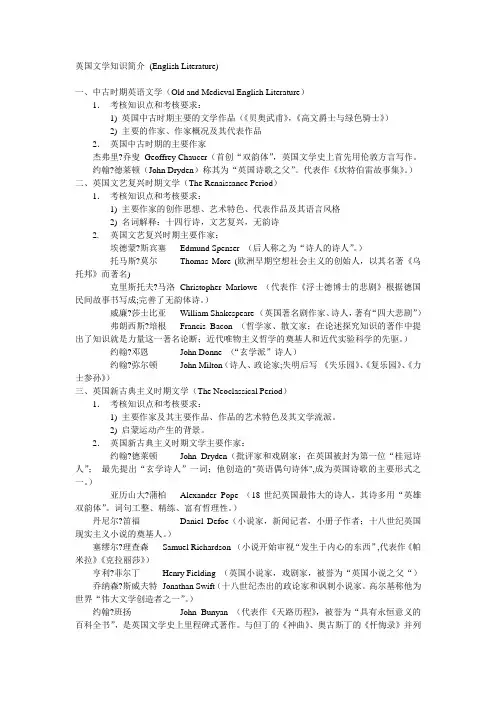
英国文学知识简介(English Literature)一、中古时期英语文学(Old and Medieval English Literature)1.考核知识点和考核要求:1) 英国中古时期主要的文学作品(《贝奥武甫》,《高文爵士与绿色骑士》)2) 主要的作家、作家概况及其代表作品2.英国中古时期的主要作家杰弗里?乔叟Geoffrey Chaucer(首创“双韵体”,英国文学史上首先用伦敦方言写作。
约翰?德莱顿(John Dryden)称其为“英国诗歌之父”。
代表作《坎特伯雷故事集》。
)二、英国文艺复兴时期文学(The Renaissance Period)1.考核知识点和考核要求:1) 主要作家的创作思想、艺术特色、代表作品及其语言风格2) 名词解释:十四行诗,文艺复兴,无韵诗2. 英国文艺复兴时期主要作家:埃德蒙?斯宾塞Edmund Spenser (后人称之为“诗人的诗人”。
)托马斯?莫尔Thomas More (欧洲早期空想社会主义的创始人,以其名著《乌托邦》而著名)克里斯托夫?马洛C hristopher Marlowe (代表作《浮士德博士的悲剧》根据德国民间故事书写成;完善了无韵体诗。
)威廉?莎士比亚William Shakespeare (英国著名剧作家、诗人,著有“四大悲剧”)弗朗西斯?培根Francis Bacon (哲学家、散文家;在论述探究知识的著作中提出了知识就是力量这一著名论断;近代唯物主义哲学的奠基人和近代实验科学的先驱。
)约翰?邓恩John Donne (“玄学派”诗人)约翰?弥尔顿John Milton(诗人、政论家;失明后写《失乐园》、《复乐园》、《力士参孙》)三、英国新古典主义时期文学(The Neoclassical Period)1.考核知识点和考核要求:1) 主要作家及其主要作品、作品的艺术特色及其文学流派。
2) 启蒙运动产生的背景。
2.英国新古典主义时期文学主要作家:约翰?德莱顿John Dryden(批评家和戏剧家;在英国被封为第一位“桂冠诗人”;最先提出“玄学诗人”一词;他创造的"英语偶句诗体",成为英国诗歌的主要形式之一。
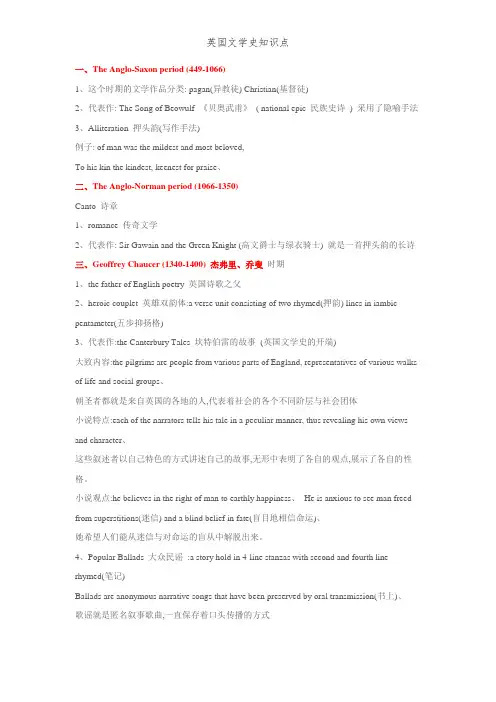
一、The Anglo-Saxon period (449-1066)1、这个时期的文学作品分类: pagan(异教徒) Christian(基督徒)2、代表作: The Song of Beowulf 《贝奥武甫》( national epic 民族史诗) 采用了隐喻手法3、Alliteration 押头韵(写作手法)例子: of man was the mildest and most beloved,To his kin the kindest, keenest for praise、二、The Anglo-Norman period (1066-1350)Canto 诗章1、romance 传奇文学2、代表作: Sir Gawain and the Green Knight (高文爵士与绿衣骑士) 就是一首押头韵的长诗三、Geoffrey Chaucer (1340-1400) 杰弗里、乔叟时期1、the father of English poetry 英国诗歌之父2、heroic couplet 英雄双韵体:a verse unit consisting of two rhymed(押韵) lines in iambic pentameter(五步抑扬格)3、代表作:the Canterbury Tales 坎特伯雷的故事(英国文学史的开端)大致内容:the pilgrims are people from various parts of England, representatives of various walks of life and social groups、朝圣者都就是来自英国的各地的人,代表着社会的各个不同阶层与社会团体小说特点:each of the narrators tells his tale in a peculiar manner, thus revealing his own views and character、这些叙述者以自己特色的方式讲述自己的故事,无形中表明了各自的观点,展示了各自的性格。
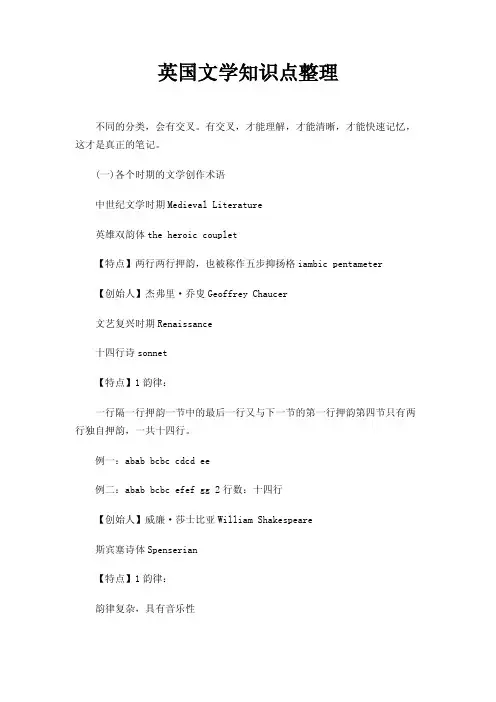
英国文学知识点整理不同的分类,会有交叉。
有交叉,才能理解,才能清晰,才能快速记忆,这才是真正的笔记。
(一)各个时期的文学创作术语中世纪文学时期Medieval Literature英雄双韵体the heroic couplet【特点】两行两行押韵,也被称作五步抑扬格iambic pentameter【创始人】杰弗里·乔叟Geoffrey Chaucer文艺复兴时期Renaissance十四行诗sonnet【特点】1韵律:一行隔一行押韵一节中的最后一行又与下一节的第一行押韵第四节只有两行独自押韵,一共十四行。
例一:abab bcbc cdcd ee例二:abab bcbc efef gg 2行数:十四行【创始人】威廉·莎士比亚William Shakespeare斯宾塞诗体Spenserian【特点】1韵律:韵律复杂,具有音乐性2行数:每节九行【创始人】埃德蒙·斯宾塞Edmund Spenser 素体诗blank verse没有押韵道德剧Morality Play神秘剧Mystery Play奇迹剧Miracle Play抑扬格四音步iambic tetrameter书信体意识流stream of consciousness(二)各种荣誉称谓"之父"称号Title作家主要作品时代流派英国诗歌之父Father of English Poetry杰弗里·乔叟Geoffrey Chaucer坎特伯雷故事集The Canterbury TalesMedieval Literature 十四世纪英国小说之父Father of English Novels丹尼尔·笛福Daniel Defoe鲁宾逊漂流记The Life and Strange Surprising Adventures of Robinson CrusoeEnlightenment 18世纪Realistic西欧历史小说之父The Father of Western European Historical Novel沃尔特·司各特Walter Scott密得洛西恩监狱The Heart of MidlothianRealistic Literature十九世纪Romanticism桂冠诗人Poet Laureate约翰·德莱顿John Dryden阿尔弗雷德·丁尼生Alfred Tennyson【作品】记忆方式伊诺克·阿登。
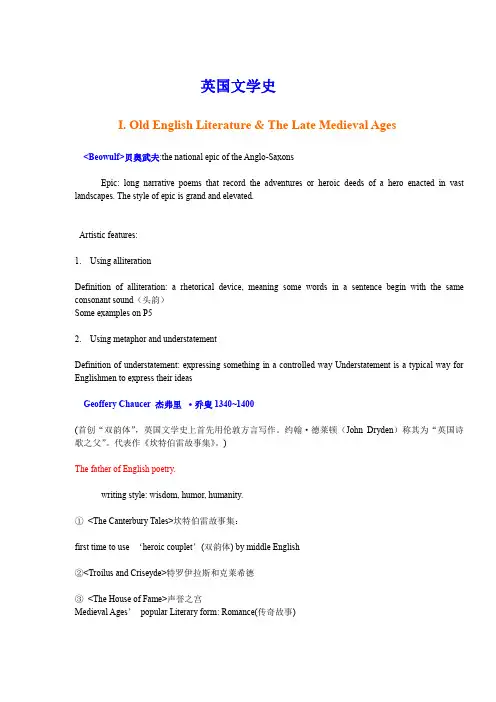
英国文学史I. Old English Literature & The Late Medieval Ages<Beowulf>贝奥武夫:the national epic of the Anglo-SaxonsEpic: long narrative poems that record the adventures or heroic deeds of a hero enacted in vast landscapes. The style of epic is grand and elevated.Artistic features:1. Using alliterationDefinition of alliteration: a rhetorical device, meaning some words in a sentence begin with the same consonant sound(头韵)Some examples on P52. Using metaphor and understatementDefinition of understatement: expressing something in a controlled way Understatement is a typical way for Englishmen to express their ideasGeoffery Chaucer 杰弗里·乔叟1340~1400(首创“双韵体”,英国文学史上首先用伦敦方言写作。
约翰·德莱顿(John Dryden)称其为“英国诗歌之父”。
代表作《坎特伯雷故事集》。
)The father of English poetry.writing style: wisdom, humor, humanity.①<The Canterbury Tales>坎特伯雷故事集:first time to use ‘heroic couplet’(双韵体) by middle English②<Troilus and Criseyde>特罗伊拉斯和克莱希德③<The House of Fame>声誉之宫Medieval Ages’popular Literary form: Romance(传奇故事)Famous three:King ArthurSir Gawain and the Green KnightBeowulfII The Renaissance PeriodA period of drama and poetry. The Elizabethan drama is the real mainstream of the English Renaissance.Renaissance: the activity, spirit, or time of the great revival of art, literature, and learning in Europe beginning in the 14th century and extending to the 17th century, marking the transition from the medieval to the modern world.Three historical events of the Renaissance – rebirth or revival:1. new discoveries in geography and astrology2. the religious reformation and economic expansion3. rediscovery of ancient Roman and Greek cultureThe most famous dramatists:Christopher MarloweWilliam ShakespeareBen Johnson.1. Edmund Spenser埃德蒙·斯宾塞1552~1599(后人称之为“诗人的诗人”。
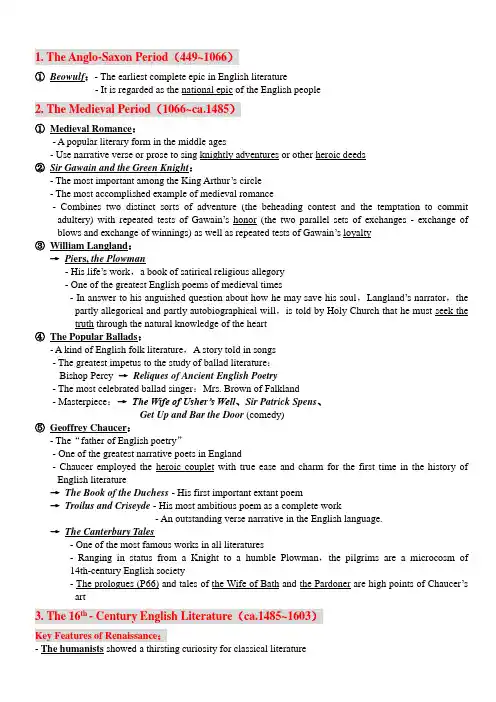
1. The Anglo-Saxon Period(449~1066)①Beowulf:- The earliest complete epic in English literature- It is regarded as the national epic of the English people2. The Medieval Period(1066~ca.1485)①Medieval Romance:- A popular literary form in the middle ages- Use narrative verse or prose to sing knightly adventures or other heroic deeds②Sir Gawain and the Green Knight:- The most important among the King Arthur’s circle- The most accomplished example of medieval romance- Combines two distinct sorts of adventure (the beheading contest and the temptation to commit adultery) with repeated tests of Gawain’s honor (the two parallel sets of exchanges - exchange of blows and exchange of winnings) as well as repeated tests of Gawain’s loyalty③William Langland:→Pi ers, the Plowman- His life’s work,a book of satirical religious allegory- One of the greatest English poems of medieval times- In answer to his anguished question about how he may save his soul,Langland’s narrator,the partly allegorical and partly autobiographical will,is told by Holy Church that he must seek the truth through the natural knowledge of the heart④The Popular Ballads:- A kind of English folk literature,A story told in songs- The greatest impetus to the study of ballad literature:Bishop Percy →Reliques of Ancient English Poetry- The most celebrated ballad singer:Mrs. Brown of Falkland- Masterpiece:→The Wife of Usher’s Well、Sir Patrick Spens、Get Up and Bar the Door (comedy)⑤Geoffrey Chaucer:- The“father of English poetry”- One of the greatest narrative poets in England- Chaucer employed the heroic couplet with true ease and charm for the first time in the history of English literature→The Book of the Duchess - His first important extant poem→Troilus and Criseyde - His most ambitious poem as a complete work- An outstanding verse narrative in the English language.→The Canterbury Tales- One of the most famous works in all literatures- Ranging in status from a Knight to a humble Plowman,the pilgrims are a microcosm of 14th-century English society- The prologues (P66) and tales of the Wife of Bath and the Pardoner are high points of Chaucer’s art3. The 16th - Century English Literature(ca.1485~1603)Key Features of Renaissance:- The humanists showed a thirsting curiosity for classical literature- They had a keen interest in life and human activitiesThe 16th – Century Poetry:①Thomas Wyatt:- First used a couplet for the conclusion of sonnet (十四行诗)- His poems was first published in →Tottel’s Miscellany→They Flee from Me、Forget Not Yet、To His Lute、Is It Possible②Henry Howard,Earl of Surrey:- The one to introduce bland verse (无韵体诗) into English literature→Aeneid-the first English attempts at blank pentameters- Milton called“heroic verse without rhyme”③Edmund Spenser:- Spenserian stanza:A stanza created by Spenser. The stanza contains 9 lines rhymed in ababbcbcc with the first 8 lines in iambic pentameter and the last line in iambic hexameter→The Shepherd’s Calendar、Epithalamion、Faerie Queene -The greatest romantic epic poem of the time- His most notable & ambitious poetic achievement- Set in the mythical world of King Arthur and his knightsThe 16th – Century Drama:①Christopher Marlowe:- One of the greatest playwrights in the English Renaissance & a great lyrical poet- He reformed the genre of drama in England and perfected the language and verse of dramatic works - He made blank verse the principal vehicle of expression in drama- He was Shakespeare’s predecessor,university wit→Hero and Leander、The Passionate Shepherd、Edward The Second→The Tragical History of Doctor Faustus- Faustus is a great scholar who has a strong interest in knowledge. He seeks the power that comes from knowledge,but he is presently weary of the knowledge that cannot provide him with wonders.So with the aid of black magic,he turns to search for power by selling his soul to Devil→Tamburlaine the Great- By depicting a great hero with high ambition and sheer brutal force in conquering one enemy after another,Marlowe voiced man’s desire for infinite power and authority(→death)→The Jew of Malta- The play is studied of the lust for wealth (→death)②William Shakespeare:- One of the most remarkable playwrights and poets the world has ever known- Altogether,he produced 37 plays (history plays,tragedies,comedies,tragic comedies),2 long narrative poems,and 154 sonnets- Comedies:→Taming of the Shrew、Love’s Labour’s Lost、Much Ado about Nothing、As You Like It、Twelfth Night、Merry Wives of Windsor、The Midsummer Night’s Dream、The Merchant of Venice- History plays:→Henry IV- Tragedies:→Hamlet (※the soliloquy P223)、Othello、King Lear、Macbeth- Romance:→The TempestThe 16th – Century Prose:①Thomas More:- An English saint and humanist- One of the greatest minds of the 16th century→The Life of Johan Picus,Earl of Myrandula→The History of King Richard III→Dialogue of Comfort against Tribulacion→Utopia-A truthful picture of the people’s sufferings on the one hand,on the other hand,the book reveals his ideal of a future happy society4. The 17th - Century English Literature(ca.1603~1700)(turmoil)The 17th – Century Drama:①Ben Johnson:- A major playwright after Shakespeare,remains a fine writer of lyric,a great satirist and a major figure in the classical tradition of literature.→V olpone、The Alchemist、Sejanus、The Devil as an Ass、Epicoene、The Silent Woman、Bartholomew Fair、Every Man in His HumorThe 17th – Century Poetry:①Metaphysical Poetry:- An intellectual poetic style full of conceits and logical reasoning using colloquial language.- Representative:John Donne- The symbol of metaphysical poetry (玄学派诗歌)- His early poetry is remarkable for realism,psychological penetration,and above all for the range and variety of mood,corresponding to the variety of tone and style. This extends from ecstatic and passionate poems,like The Sun Rising to the deliberately cynical flippancy of The Flea②Cavalier Poets:- Representative:Ben Johnson(见前面的介绍)③John Milton:→Paradise Lost- One of the finest epic poems in the English language- P320 the 1st stanza and its last sentence“I may assert Eternal Providence,and justify the ways of God to men.”→Paradise Regained、Samson AgonistesThe 17th – Century Prose:①Francis Bacon:- The best prose writer of this period →Essays②John Bunyan:- The contemporary of John Milton→The Pilgrim’s Progress- A work of religious faith( ※P362 an excerpt from this book -“The Vanity Fair”)③John Dryden:- The father of English literary criticism- The most important literary figure of the Restoration period- He is known as a poet,playwright and literary critic- The earliest literary critic of real importance in the History of English literature→An Essay of Dramatic Poesy5. The 18th - Century English Literature(1700~1798)(Enlightenment)- People could understand and control the world by means of reason and empirical researchThe 18th – Century Poetry:①Neo-classicism (harmony,elegance,restrained emotion)Alexander Pope:→An Essay on Criticism-A manifest to of English neo-classicism→The Rape of the Lock- One of the best mock epics②Sentimentality (Also neo-classicism)Thomas Gray:- He was known as a sentimental poet→An Elegy Written in a Country Churchyard③Pre-romantic:William Blake:- A famous democratic poet whose poetry is mainly about the life in London,chiefly the sufferings and hardships of the common people in the big city→Songs of Innocence、Songs of ExperienceRobert Burns:- The best known Scottish lyric poet- His poems were all short poems about different themes and in different forms- Most of his poems were written in the Scottish dialect yet a few in EnglishJonathan Swift:- One of the greatest masters of prose in the 18th century→Gulliver’s Travels、A Modest Proposal②Samuel Johnson:- An energetic and versatile writer( P441 the last but one paragraph of the letter:※“Is not a patron…”)- The leader of the school of neo-classicism in this period→The Dictionary of the English Language、The Lives of Poets→To the Right Honorable the Earl of Chestfield- His famous prose,which is regarded as the manifesto of independence of literary men in English literatureThe 18th – Century Novel:①Daniel Defoe:- A radical Non-conformist or Dissenter in religion→Robinson Crusoe②Samuel Richardson:- He is famous for his epistolary novel (书信体小说) writing→Pamela (or Virtue Rewarded)③Henry Fielding:- The greatest novelist of the eighteenth century- One of the greatest that English ever produced→Josoph Andrews、The History of Tom Jones (comic epic in prose )、The History of Jonathan Wild the Great、A Foundling、Amelia、5. The (19th –C) Romantic English Literature(1798~1832)Historical Background:- At the end of 18th century,the history in English started to move with a new urgency which was provoked by two important revolutions: the French Revolution and the English Industrial Revolution- The Romantic period is an age of poetry. The major Romantic poets started a rebellion against theWilliam Wordsworth (poet of nature):- Calls for simple themes drawn from humble life expressed in the language of ordinary people- He defines the poetry as “the spontaneous overflow of powerful feelings,which originates in emotion recollected in tranquility.”- Wordsworth,Coleridge and Robert Southey have often been mentioned as the “Lake poets”because they lived in the lake district in the northwestern part of England. The three traversed the same path in politics and in poetry,beginning as radicals and ending up as conservatives→I Wandered Lonely as a Cloud (▲P19)、→She Dwelt Among the Untrodden Ways、The Solitary Reaper②Samuel Taylor Coleridge (poet of imagination):- He was both a famous Romantic poet and an important literary critic- His works were marked by mysticism→The Rime of the Ancient Mariner、Kubla Khan③George Gordon Byron (poet of liberty/people):- On the whole,Byron’s poetry is one of experience. His heroes are more or less surrogates of hi mself,i.e. Byronic hero- He is regarded as “Satanic poet”and the charming of his poetry lies in the exposition and criticism of all social evils in the existing society→Don Juan- A great comic epic of the early 19th century→She Walks in Beauty(▲P75):④Percy Bysshe Shelley (poet of rhapsody):→Ode to the West Wind -“If Winter comes,can Spring be far behind?”⑤John Keats (poet of beauty):→Ode to a Nightingale、(P97 ※“Beauty is truth,truth is beauty”)Jane Austen:→Sense and Sensibility、Northanger Abbey、Mansfield Park、Emma、Persuasion、→Pride and Prejudice( P109※the 3rd paragraph “Elizabeth’s astonishment w as…”)②Walter Scott:- Scott has been considered as the creator or master of historical novels or historical romances.According to the subject matter of his novels,we divided his books into 3groups:- Novels based on the history of Scotland:→Waverley、Rob Roy- Novels based on English history:→Ivanhoe (his masterpiece)- Novels based on Continental history6. The (19th –C) Victorian English Literature(1832~1900)Historical Background:- It’s a long time of prosperity,with social problems and ideological changes. Darwin’s Origin of Species shook the theoretical basis of the conventional religious faith (loss of faith). Utilitarianism (Naturalism:people are totally controlled by natural law) was widely accepted and practicedVictorian Poetry:①Alfred Tennyson:- The most representative Victorian poet→In Memorian②Robert Browning:- His name is often associated with the term“dramatic monologue”that is,a lyric poem which reveals “a soul in action”through the conversation of one character in a dramatic situationCharles Dickens:- The greatest representative of English Critical realists→The Pickwick Papers、Oliver Twist、The Old Curiosity Shop、→Dombey and Son、David Copperfield (autobiographical novel)→Bleak House、Hard Times、A Tale of Two Cities、→Great Expectations(▲P232): -- to be a true,honest man - the expectation②William Makepeace Thackeray:→V anity Fair→The Book of Snobs→The History of Henry Esmond ( His best historical work )③Charlotte Bronte & Emily Bronte:- One of the famous sister writers in the history of English literature→Jane Eyre→Wuthering Heights④George Eliot:- His concept of determinism(宿命论) is a system of human relationships - private and public→Scenes of Clerical Life、Adam Bede、The Mill on the Floss、Silas Marner、→Romola、Holix the Radical、Daniel Deronda⑤Thomas Hardy:- English poet and regional novelist,famous for his depictions of the imaginary county “Wessex”- Hardy's work reflected his stoical pessimism and sense of tragedy in human life→The Return of the Native、The Trumpet Major、→The Mayor of Casterbridge、The Woodlanders、→Tess of the D’Urbervilles、Jude the Obscure7. The Early 20th –Century English Literature(1900~1970)Early 20th –Century Novel:①Joseph Conrad:→Heart of Darkness(One of the pioneers of the modernist novel in English)→Lord Jim(One of the pioneers of the modernist novel in English)→Nostromo② E. M. Forster:- An important member of the Bloomsbury Group,which included some liberal-minded intellectualswho made free discussions and criticisms of the social,religious,and moral issues of the then English society→Howards End、A passage to India③ D. H. Lawrence:- One of the greatest English novelists of the 20th century- The greatest from England proper and from a working-class family→Sons and Lovers、The Rainbow、Women in Love④James Joyce:- One of the most prominent literary figures of the first half of the 20th century→Dubliners、A Portrait of the Artist as a Young Man、Ulysses、Finnegans Wake⑤Virginia Woolf:、The WavesWilliam Butler Yeats:→The Lake Isle of Innisfree ( P 490 重点)→Down by the Sally Gardens (P 491 重点)②Thomas Stearns Eliot:→The Love Song of J. Alfred Prufrock(His most striking early achievement)→The Waste Land(His most important single poem,has been hailed as a landmark and a model of the 20th century English poetry)Early 20th –Century Drama:①George Bernard Shaw:- Irish dramatist,literary critic,a socialist spokesman,and a leading figure in the 20th century theater.Shaw was a freethinker,a supporter of women's rights and an advocate of equality of income. In 1925 he was awarded the Nobel Prize for Literature. Shaw accepted the honor but refused the money→Mrs. Warren’s Profession→Major Barbara→Man and Superman→Pygmalion。

英国文学史知识点 Revised by BETTY on December 25,2020一、The Anglo-Saxon period (449-1066)1、这个时期的文学作品分类: pagan(异教徒) Christian(基督徒)2、代表作: The Song of Beowulf 《贝奥武甫》 ( national epic 民族史诗 ) 采用了隐喻手法3、Alliteration 押头韵(写作手法)例子: of man was the mildest and most beloved,To his kin the kindest, keenest for praise.二、The Anglo-Norman period (1066-1350)Canto 诗章1、romance 传奇文学2、代表作: Sir Gawain and the Green Knight (高文爵士和绿衣骑士) 是一首押头韵的长诗三、Geoffrey Chaucer (1340-1400) 杰弗里.乔叟时期1、the father of English poetry 英国诗歌之父2、heroic couplet 英雄双韵体:a verse unit consisting of two rhymed(押韵) lines in iambic pentameter(五步抑扬格)3、代表作:the Canterbury Tales 坎特伯雷的故事 (英国文学史的开端)大致内容:the pilgrims arepeople from various parts of England, representatives of various walks of life and social groups.朝圣者都是来自英国的各地的人,代表着社会的各个不同阶层和社会团体小说特点:each of the narrators tells his tale in a peculiar manner, thus revealing his own views and character.这些叙述者以自己特色的方式讲述自己的故事,无形中表明了各自的观点,展示了各自的性格。
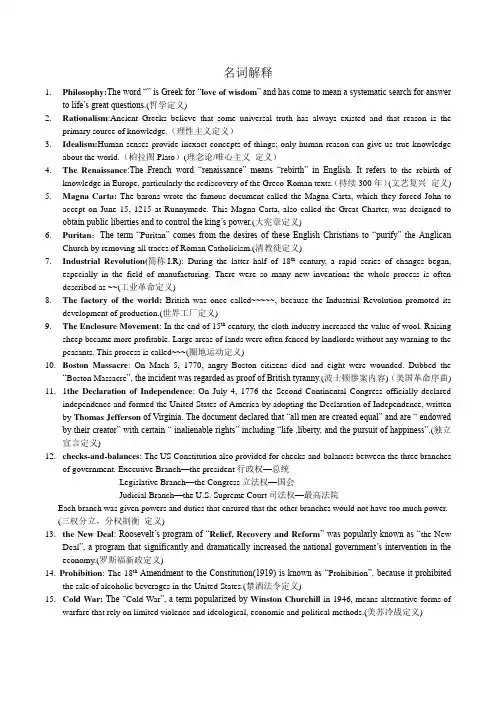
名词解释1.Philosophy:The word “” is Greek for “love of wisdom” and has come to mean a systematic search for answerto life’s great questions.(哲学定义)2.Rationalism:Ancient Greeks believe that some universal truth has always existed and that reason is theprimary source of knowledge.(理性主义定义)3.Idealism:Human senses provide inexact concepts of things; only human reason can give us true knowledgeabout the world.(柏拉图Plato)(理念论/唯心主义定义)4.The Renaissance:The French word “renaissance” means “rebirth” in English. It refers to the rebirth ofknowledge in Europe, particularly the rediscovery of the Greco-Roman texts.(持续300年)(文艺复兴定义) 5.Magna Carta: The barons wrote the famous document called the Magna Carta, which they forced John toaccept on June 15, 1215 at Runnymede. This Magna Carta, also called the Great Charter, was designed to obtain public liberties and to control the king’s power.(大宪章定义)6.Puritan:The term “Puritan” comes from the desires of these English Christians to “purify” the AnglicanChurch by removing all traces of Roman Catholicism.(清教徒定义)7.Industrial Revolution(简称I.R): During the latter half of 18th century, a rapid series of changes began,especially in the field of manufacturing. There were so many new inventions the whole process is often described as ~~(工业革命定义)8.The factory of the world:British was once called~~~~~, because the Industrial Revolution promoted itsdevelopment of production.(世界工厂定义)9.The Enclosure Movement: In the end of 15th century, the cloth industry increased the value of wool. Raisingsheep became more profitable. Large areas of lands were often fenced by landlords without any warning to the peasants. This process is called~~~(圈地运动定义)10.Boston Massacre: On Mach 5, 1770, angry Boston citizens died and eight were wounded. Dubbed the“Boston Massacre”, the incident was regarded as proof of British tyranny.(波士顿惨案内容)(美国革命序曲) 11.1the Declaration of Independence: On July 4, 1776 the Second Continental Congress officially declaredindependence and formed the United States of America by adopting the Declaration of Independence, written by Thomas Jefferson of Virginia. The document declared that “all men are created equal” and are “ endowed by their creator” with certain “ inalienable rights” including “life ,liberty, and the pursuit of happiness”.(独立宣言定义)12.checks-and-balances: The US Constitution also provided for checks-and-balances between the three branchesof government. Executive Branch—the president行政权—总统Legislative Branch—the Congress立法权—国会Judicial Branch—the U.S. Supreme Court司法权—最高法院Each branch was given powers and duties that ensured that the other branches would not have too much power.(三权分立,分权制衡定义)13.the New Deal: Roosevelt’s program of “Relief, Recovery and Reform” was popularly known as “the NewDeal”, a program that significantly and dramatically increased the national government’s intervention in the economy.(罗斯福新政定义)14.Prohibition: The 18th Amendment to the Constitution(1919) is known as “Prohibition”, because it prohibitedthe sale of alcoholic beverages in the United States.(禁酒法令定义)15.Cold War:The “Cold War”, a term popularized by Winston Churchill in 1946, means alternative forms ofwarfare that rely on limited violence and ideological, economic and political methods.(美苏冷战定义)16.Mayflower: In 1620, a group of 132 Separatists (Puritans who had “separated” or left the Church of England)boarded the Mayflower and sailed for Virginia. The Mayflower was blown off course and landed in what is now Massachusetts, far to the north of Virginia.(五月花)简答、填空、选择1.What role did Winston Churchill play in World War II? (丘吉尔在二战中起到什么作用?)⑴He played the important role in World War II.⑵In 1941, he led the country through the miracle of Dunkirk, that was 338000 allied solders’ evacuation to Britain.⑶In 1943, he met Stalin and Roosevelt at Teheran Conference and decided to open the Second Battlefield West Europe.⑷In 1945, he proposed to fight against the Japanese Army till the end of the war.2.Why did I.R firstly take place in Britain?(工业革命首先在英国爆发的原因?)There are four prerequisites.4个先决条件Firstly, the accumulation of original capital.资本的原始积累Second, the development of capitalistic farming.资本主义农业取得发展Third, the appearance of free labor reserve.自由劳动力的出现Fourth, the expansion of markets, domestic and foreign.国内外市场的扩张3.New York为什么叫Big Apple?New York’s nickname is “the Big Apple”, a phrase used by jazz musicians to explain the ultimate in achievement, size and excitement.4.The first major Greek philosopher was Thales. Thales claimed that Nature is rational. He asked, “From whatdo all things come and to what do all things return?”(泰勒斯)5.Furthermore,this was the origin of metaphysics, the philosophical study which probes the nature of realityitself.形而上学6.数学家Pythagoras explained the entire natural world with numbers.(提出数字3)3=1(unity)+2(diversity)Three elements of Universe------earth, ocean, heavenThree elements of World ------animals, plants, mineralsThree elements of Gods ------Jupiter, Neptune, PlutoThree elements of Goddess ------Fate, Revenge, Beauty早期基督教教义Trinity (三位一体)人类3个indispensables------body, soul, spirit7.赫拉克利特Heraclitus is remembered because he introduced the concept of change as the onlyunchanging reality in the universe.He compared life to a flowing river:A person cannot step into the same river twice.8.德谟克利特Democritus. He argued that everything in the universe obeys the laws of necessity(必然性法则).9.观点:机械论His mechanistic view of the world was accepted by western thinkers as early as the 16thcentury.10.“Atom” means “uncuttable”(原子→不可分割)11.At the time when Chinese scholars, Confucians and Taoists, were concerned with social relationships andhuman harmony with the natural world, Greek philosophers were arguing about what Nature itself was.12.Athens was famous for its writers, architects, sculptors, thinkers and sports contests, including the originsof the modern-day Olympic Games.(雅典,奥林匹克发源地)13.Socrates→Lived in Athens.(苏格拉底,雅典人)One thing only I know, and that is that I know nothing.He distinguished between two types of knowledge: inner knowledge and empirical knowledge.Inner指each person has Virtue which is not learned through the physical sense.Another major contribution was his question-and-answer technique.14.Aristotle亚里士多德If Plato’s motto was “Mind over Matter”, then Aristotle’s motto was “Matter over Mind”.Aristotle founded the science of logic. His method is called a syllogism which argues from a general principle to a specific examples:General Principle: All men are mortal.Connection: I am a man.Deductive Conclusion: I am mortal.15.牛顿运动定律Newton’s laws of motion explained all visible motions,from those of stars to those of tinypebbles.16.培根Bacon, a British statesman and writer, wrote the first description of the modern scientific method.“Of studies”, “Essays”17.笛卡尔Descartes has also been called the father of modern Rationalism and the father of modern westernphilosophy.(近代理性主义之父,近代西方哲学之父)I think; therefore, I am.我思故我在。
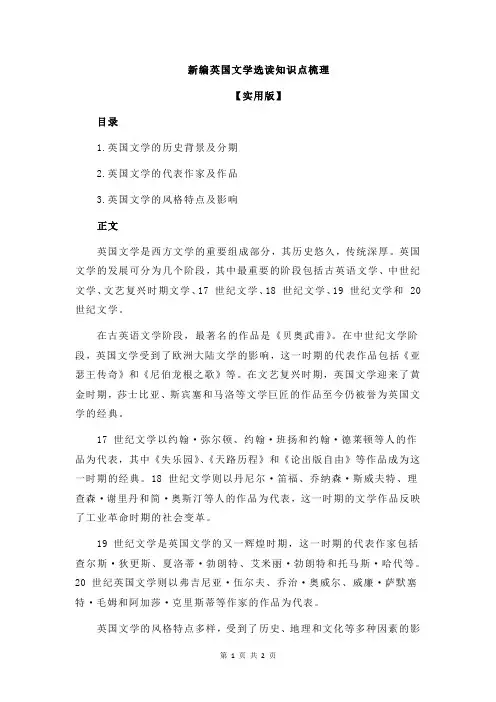
新编英国文学选读知识点梳理【实用版】目录1.英国文学的历史背景及分期2.英国文学的代表作家及作品3.英国文学的风格特点及影响正文英国文学是西方文学的重要组成部分,其历史悠久,传统深厚。
英国文学的发展可分为几个阶段,其中最重要的阶段包括古英语文学、中世纪文学、文艺复兴时期文学、17 世纪文学、18 世纪文学、19 世纪文学和 20 世纪文学。
在古英语文学阶段,最著名的作品是《贝奥武甫》。
在中世纪文学阶段,英国文学受到了欧洲大陆文学的影响,这一时期的代表作品包括《亚瑟王传奇》和《尼伯龙根之歌》等。
在文艺复兴时期,英国文学迎来了黄金时期,莎士比亚、斯宾塞和马洛等文学巨匠的作品至今仍被誉为英国文学的经典。
17 世纪文学以约翰·弥尔顿、约翰·班扬和约翰·德莱顿等人的作品为代表,其中《失乐园》、《天路历程》和《论出版自由》等作品成为这一时期的经典。
18 世纪文学则以丹尼尔·笛福、乔纳森·斯威夫特、理查森·谢里丹和简·奥斯汀等人的作品为代表,这一时期的文学作品反映了工业革命时期的社会变革。
19 世纪文学是英国文学的又一辉煌时期,这一时期的代表作家包括查尔斯·狄更斯、夏洛蒂·勃朗特、艾米丽·勃朗特和托马斯·哈代等。
20 世纪英国文学则以弗吉尼亚·伍尔夫、乔治·奥威尔、威廉·萨默塞特·毛姆和阿加莎·克里斯蒂等作家的作品为代表。
英国文学的风格特点多样,受到了历史、地理和文化等多种因素的影响。
英国文学在语言运用、情节安排和人物塑造等方面都有独特的技巧,使其在世界文学史上具有重要地位。
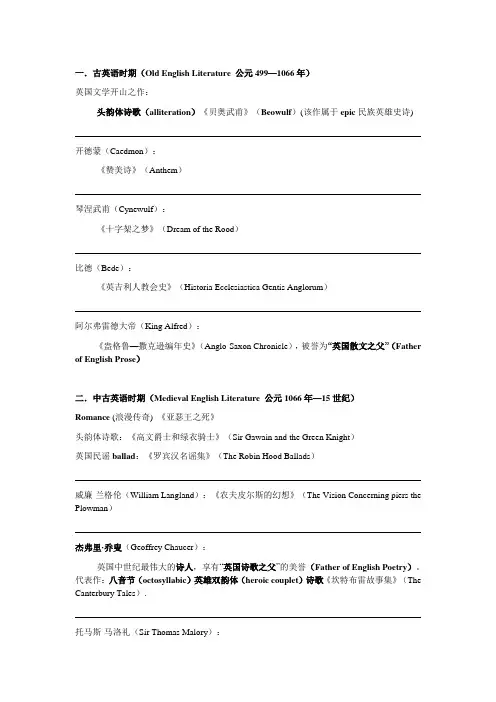
一.古英语时期(Old English Literature 公元499—1066年)英国文学开山之作:头韵体诗歌(alliteration)《贝奥武甫》(Beowulf)(该作属于epic民族英雄史诗)开德蒙(Caedmon):《赞美诗》(Anthem)琴涅武甫(Cynewulf):《十字架之梦》(Dream of the Rood)比德(Bede):《英吉利人教会史》(Historia Ecclesiastica Gentis Anglorum)阿尔弗雷德大帝(King Alfred):《盎格鲁—撒克逊编年史》(Anglo-Saxon Chronicle),被誉为“英国散文之父”(Father of English Prose)二.中古英语时期(Medieval English Literature 公元1066年—15世纪)Romance (浪漫传奇) 《亚瑟王之死》头韵体诗歌:《高文爵士和绿衣骑士》(Sir Gawain and the Green Knight)英国民谣ballad:《罗宾汉名谣集》(The Robin Hood Ballads)威廉·兰格伦(William Langland):《农夫皮尔斯的幻想》(The Vision Concerning piers the Plowman)杰弗里·乔叟(Geoffrey Chaucer):英国中世纪最伟大的诗人,享有“英国诗歌之父”的美誉(Father of English Poetry)。
代表作:八音节(octosyllabic)英雄双韵体(heroic couplet)诗歌《坎特布雷故事集》(The Canterbury Tales).托马斯·马洛礼(Sir Thomas Malory):英国15世纪优秀的散文家,代表作为《亚瑟王之死》(Le Morte d’Arthur)三.文艺复兴时期(Renaissance 15世纪末—17世纪)托马斯·莫尔(Thomas More):伟大的人文主义者,代表作:《乌托邦》(Utopia),《国王爱德华五世悲戚的一生》(The painful Life of Edward Ⅴ).托马斯·魏厄特(Thomas Wyatt)和亨利·霍华德(Henry Howard)的十四行诗(Sonnet).前者将意大利十四行诗引入英国;后者在此基础上,发展了英国十四行诗歌。
I. Early and Medieval English Literature (5th century-15th century)1. Bewolf 《贝尔武甫》2. The Legend of King Arthur and his Round Table Knights;《亚瑟王和他的圆桌骑士》“Sir Gawain and the Green Knight” 《高文爵士和绿衣骑士》3. William Langland (1330-1400) Piers the Plowman《农夫皮尔斯》4. Geoffrey Chaucer (1340-1400) 杰弗里•乔叟The Canterbury Tales (1387-1400)《坎特伯雷故事集》The Romanunt of the Rose 《玫瑰罗曼史》Troilus and Criseyde《特罗勒斯和克丽西德》The House of Fame《声誉之堂》II. English Literature of the Renaissance (16th century) —the Elizabethan Age (1558-1603)1. Thomas More (1478-1535)Utopia (1516) 《乌托邦》2. Edmund Spenser (1552-99)The Faerie Queen (1596) 《仙后》The Shepherd’s Calendar (1597 《牧人日历》3. Christopher Marlowe (1564-93)Tamburlaine the Great (1587)《帖木儿》Dr. Faustus (1589)《浮士德博士的悲剧》The Jew of Malta (1590) 《马耳他的犹太人》The Passionate Shepherd to His Love 《多情牧童致爱人》4. William Shakespeare (1564-1616)The First Period (1590-1594)1590 Henry VI, Part II《亨利六世中篇》Henry VI, Part III《亨利六世下篇》1591 Henry VI, Part I 《亨利六世上篇》1592 Richard III《理查三世》The Comedy of Errors 《错误的喜剧》1593 Titus Andronicus《泰特斯•安德洛尼克斯》The Taming of the Shrew《训悍记》1594 The Two Gentlemen of Verona《维洛那二绅士》Love’s Labour’s Lost《爱的徒劳》Romeo and Juliet 《罗密欧与朱丽叶》Two narrative poems:Venus and Adonis 《维纳斯与阿多尼斯》The Rape of Lucrece《露克丽丝受辱记》The Second Period (1595-1600)The second period of Shakespeare’s work is his mature period, mainly a period of “great comedies” and mature historical plays.1595 Richard II 《理查二世》A Midsummer Night’s Dream《仲夏夜之梦》1596 King John《约翰王》The Merchant of Venice 《威尼斯商人》1597 Henry IV, Part I《亨利四世上篇》Henry IV, Part II《亨利四世下篇》1598 Much Ado about Nothing《无事生非》Henry V《亨利五世》The Merry Wives of Windsor《温莎的风流娘儿们》1599 Julius Caesar《裘力斯•凯撒》As You Like It《皆大欢喜》1600 Twelfth Night《第十二夜》The Third Period (1601-1607)The third period of Shakespeare’s dramatic career is mainly the period of “great tragedies” and “dark comedies”.1601 Hamlet《哈姆莱特》1602 Troilus and Cressida《特洛伊罗斯与克瑞西达》1603 All’s Well That Ends Well《终成眷属》1604 Measure for Measure《一报还一报》Othello《奥瑟罗》1605 King Lear《李尔王》Macbeth《麦克白》1606 Antony and Cleopatra《安东尼与克莉奥佩特拉》1607 Coriolanus 《科利奥兰纳斯》Timon of Athens 《雅典的泰门》The Fourth Period (1608-1602)The fourth period of Shakespeare’s work is the period of romantic drama.1608 Pericles《泰尔亲王配瑞克里斯》1609 Cymbeline《辛白林》1610 The Winter’s Tale《冬天的故事》1601 The Tempest《暴风雨》1612 Henry VIII《亨利八世》5. Ben Jonson (1573-1637)Every Man in His Humor (1598)V olpone, or the Fox (1606)The Alchemist (1610) 《炼金术士》Bartholomew Fair (1614)6. Francis Bacon (1561-1626)Advancement of Learning, 1605 《学术的进展》Novum Organum, 1620《新工具》New Atlantics, 1627《新大西岛》Essays, 1597,1612,1625 《论说文集》III. English Literature during the English Bourgeois Revolution and the Restoration (17th century)1. John Milton (1608-1674)“Morning of Christ’s Nativity”(1629)“圣诞晨歌”“L’ Allegro” (1632) “欢乐的人”“Il Penseroso” (1632) “沉思的人”Areopagitica (1644)《论出版自由》Deference of the English People (1651)《为英国人民辨》Second Deference of the English People (1654)《再为英国人民辨》Paradise Lost (1667)《失乐园》Paradise Regained (1671)《复乐园》Samson Agonistes (1671)《力士参孙》2. John Donne (1572-1631)3. Andrew Marvell (1621-1678)“To His Coy Mistress”《给他羞怯的情人》4. Robert Herrick (1591-1674)“Gather ye Rosebuds while ye May”《花开堪折直须折》5. John Bunyan (1628-1688)T he Pilgrim’s Progress (1678) 《天路历程》The Life and Death of Mr. Badman (1680)Grace Abounding to the Chief of Sinners《罪人受恩记》6. John Dryden (1631-1700)“All for Love”《一切为了爱》“Absalom and Achitophel”“A Song for St. Ceilia’s Day, 1687”“Alexander’s Feast”“An Essay of Dramatic Poesy”IV. English Literature of the 18th Century (18th century)1. Alexander Pope (1688-1744)An Essay on Criticism (1711) 《论批评》The Rape of the Lock (1714)《夺发记》The Dunciad (1728-1742)《愚人志》Essay on Man (1732-1734)《人论》2. Richard Steele (1672-1729) and “The Tatler”《闲话》报(1709-1711)3. Joseph Addison (1672-1719) and “The Spectator” 《旁观者》报(1711-1712)4. Daniel Defoe (1660-1731)The True Born Englishman (1701)《真正的英国人》The Shortest Way with the Dissenters (1702)《消灭不同教派的捷径》Robinson Crusoe (1719)《鲁滨逊漂流记》Moll Flanders (1722)《摩尔•弗兰德》A Journal of the Plague Year (1722)《大疫年日记》5. Samuel Richardson (1689-1761)Pamela: or, Virtue Rewarded (1742)《帕美拉,或德行有报》Clarissa: or The History of a Young Lady (1747)《克莱丽莎》The History of Sir Charles Grandison (1754)《查尔斯•格兰迪森爵士的历史》6. Jonathan Swift (1667-1745)The Battle of Books (1697)《书籍之战》A Tale of a Tub (1698)《一个木桶的故事》Drapier’s Letters (1724)《布商的来信》Gulliver’s Travels (1726)《格列佛游记》7. Henry Fielding (1707-1754)The Coffee-house Politician (1730)《咖啡屋政客》Don Quixote in England (1734)《堂吉诃德在英国》The History of the Adventures of Joseph Andrews (1742)《约瑟夫•安德鲁》The History of Mr. Jonathan Wild the Great (1743)《大伟人江奈生•魏尔德伟》The History of Tom Jones, A Foundling (1749)《汤姆•琼斯》8. Richard Brinsley Sheridan (1751-1816)The Rivals (1775)《情敌》St. Patrick’s Day (1775)《圣帕特里克日》The School for Scandal (1777)《造谣学校》A Trip to Scarborough (1777)《思卡波罗之行》9. Samuel Johnson (1709-1784)A Dictionary of the English Language (1755)《英语大辞典》Lives of the Poets (1779-1781)《诗人传》The Vanity of Human Wishes《人类欲望之虚幻》10. James Boswell (1740-1795)Life of Johnson《约翰逊传》11. Edward Gibbon (1737-1794)The Decline and Fall of the Roman Empire 《罗马帝国衰亡史》12. Laurence Stern (1713-1768)The Life and Opinions of Tristram Shandy (1760-67)《项狄传》A Sentimental Journey (1768)《伤感之旅》13. Oliver Goldsmith (1730-1774)The Bee (1759)《蜜蜂》The Citizen of the World (1760—1761)《世界公民》The Vicar of Wakefield: A Tale (1766)《威克菲尔牧师传》The Deserted Village (1770)《荒村》She Stoops to Conquer (1773) 《屈身俯就》14. Thomas Gray (1716-1765)Ode on the Spring (1742)春天颂Ode on a Distant Prospect of Eton College (1747)《伊顿颂歌》Elegy Written in a Country Churchyard (1750)《墓园挽歌》The Progress of Poetry (1757) 《诗歌的进程》15. Robert Burns (1759-1796)Poems, Chiefly in the Scottish Dialect (1786)《苏格兰方言诗集》“To a Mouse”“致老鼠”“To a Louse” “致虱子”“Scots Wha Hae” “苏格兰人”“My Heart’s in the Highlands”“我的心呀在高原”“Auld Lang Syne”“过去的好时光”“A Red, Red Rose” 《一朵红红的玫瑰》16. William Blake (1757-1827)Poetical Sketches (1783)《素描诗集》Songs of Innocence (1789)《天真之歌》The French Revolution (1791)《法国革命》The Marriage of Heaven and Hell (1793)《天堂与地狱的婚姻》Songs of Experience (1794)《经验之歌》V. Romanticism in England — the Romantic Period (early 19th century)1. William Wordsworth (1770-1850)Lyrical Ballads (1789)《抒怀歌谣集》Lucy Poems (1799)《露西组诗》“The Solitary Reaper”(1807)“孤独的刈麦女”“I Wandered Lonely as a Cloud” (1807)“我似孤独流云”The Prelude (1850)《序曲》“My Hearts Leaps Up” “我的心跳了起来”Tintern Abbey 《丁登寺旁》2. Samuel Taylor Coleridge (1772-1834)“The Fall of the Bastille” (1789)“巴士底狱的倒塌”Lyrical Ballads (1789)《抒情歌谣集》“The Rime of the Ancient Mariner”(1798)“老水手谣”“Kulbla Khan”(1816)“忽必烈汗”Biographa Literaria (1817)《文学传记》3. Robert Southey (1774-1843)Joan of Arc《圣女贞德》Walt Tyler《瓦特•泰勒》The Fall of Robespierre《罗伯斯庇尔之死》The Life of Nelson 《纳尔逊传》4. George Gordon Byron (1788-1824)Hours of Idleness (1807)《懒散时刻》Childe Harold’s Pilgrimage (Canto I and II 1812; Canto III 1816; Canto IV, 1818)《恰尔德哈罗德游记》Oriental Tales (1813-1816)《东方叙事诗》Don Juan (1818-1823)《唐璜》The Age of Bronze (1822)《青铜时代》5. Percy Bysshe Shelley (1792-1822)“Queen Mab”(1813)“麦布女王”“The Masque of Anarchy”(1819)“专制魔王的化妆舞会”“Ode to West Wind” (1819)“西风颂”“Song to the Men of England”(1819)“致英国人民”“England in 1819”(1819)“一八一九年的英国”“Prometheus Unbound” (1819)“解放了的普罗米修斯”“To a Skylark” (1820)“致云雀”“A Defense of Poetry”(1821)“诗辩”6. John Keats (1795-1821)“Endymion”(1818)“恩底弥翁”“Isabella; or the Pot of Basil” (1820)“伊莎贝拉”“Ode to a Nightingale” (1819)“夜莺颂”“Ode on a Grecian Urn” (1819)“希腊古瓮颂”“Ode on Melancholy” (1819) “忧郁颂”“Ode to Autumn” (1819) “秋颂”“La Belle Dame Sams Merci”(1820)“无情的美女”“Sonnet on Peace” “和平十四行诗”7. Charles Lamb (1775-1843)Essays of Elia (1823;1833)《伊利亚随笔》Tales from Shakespeare (1807) 《莎士比亚戏剧故事集》Specimens from English Dramatic Poets Contemporary with Shakespeare《莎士比亚时期英国戏剧诗人选》8. Thomas De Quincey (1785-1859)The Confession of an English Opium-Eater《一个英国吸食鸦片者的自白》9. Mary ShellyFrankenstein《弗兰肯斯坦》10. Walter Scott (1771-1832)The Minstrelsy of the Scottish Border(1802-1803)《英格兰边区歌谣集》The Lay of the Last Minstrel (1805) 《末代歌者之歌》The Lady of the Lake (1810)《湖上夫人》Waverly (1814)《威弗利》Guy Mannering (1815)《盖•曼纳令》Rob Roy (1817)《罗布•罗伊》Ivanhoe (1819)《艾凡赫》11. Jane Austen (1775-1817)Sense and Sensibility (1811)《理智与情感》Pride and Prejudice (1813)《傲慢与偏见》Mansfield Park (1814)《曼斯菲尔德庄园》Emma (1816)《爱玛》Northanger Abbey (1818)《诺桑觉寺》Persuasion (1818)《劝导》VI. English Critical Realism (second half of the 19th century) — the Victorian Age (1837-1901)1. Charles Dickens (1812-1870)1836 Sketches by Box《博兹特写集》1836-1837 The Pickwick Papers《匹克威克外传》1837-1838 Oliver Twist《雾都孤儿》1838-1839 Nicholas Nickleby《尼古拉斯•尼克贝尔》1840-1841 The Old Curiosity Shop 《老古玩店》1841 Barnaby Rudge1842 American Notes 《游美札记》1843-1845 Martin Chuzzlewit《马丁•朱速尔唯特》1843 A Christmsa Carol《圣诞欢歌》1844 The Chimes《钟乐》1845 The Cricket on the Hearth《炉边蟋蟀》1846-1848 Dombey and Son《董贝父子》1849-1850 David Copperfield 《大卫•科波菲尔》1852-1853 Bleak House《荒凉山庄》1854 Hard Times《艰难时世》1855-1857 Little Dorrit《小杜丽》1859 A Tale of Two Cities《双城记》1860-1861 Great Expectations《远大前程》1864-1865 Our Mutual Friend 《我们的共同朋友》2. William M. Thackeray (1811-63)The Book of Snobs (1847)《势利人脸谱》Vanity Fair (1847-1848)《名利场》Pendennis (1848-1850)《潘丹尼斯》The History of Pendennis (1850) 《潘丹尼斯的历史》The History of Henry Esmond (1852)《亨利•埃斯蒙德》The Newcomers (1853-1855)《纽克姆一家》The Virginians (1857-1859)《弗吉尼亚人》Lovel the Widower (1860)《鳏夫洛弗尔》Adventures of Philip (1861-1862) 《菲利普历险记》3. Charlotte Bronte (1816-1855)Jane Eyre (1847)《简•爱》Shirley (1849)《谢利》Vilette (1853)《维莱特》The Professor (1857) 《教授》4. Emily Bronte (1818-1848)Wuthering Heights (1847)《呼啸山庄》5. Anne Bronte (1820-1849 )Agnes Grey 《艾格尼丝•格雷》6. William Morris (1834-1896)News from Nowhere 《来自乌有乡之消息》A Dream of John Ball《梦遇约翰•保尔》The Earthly Paradise 《人间乐园》Chants for Socialism《社会主义歌集》7. Robert Stevenson (1850-1894)Treasure Island《金银岛》New Arabian Nights《新天方夜谭》Kidnapped《诱拐》A Child’s Garden of Verses《儿童诗园》8. Oscar Wilde (1856-1900)An Ideal Husband《理想丈夫》The Picture of Dorain Gray《道林•格雷画像》A Woman of No Importance《一个无足轻重的女人》The Importance of Being Earnest《认真的重要性》Lady Windermere’s Fan《温德米尔夫人的扇子》The Ballad of Reading Gaol《累丁狱之歌》The Happy Prince and Other Tales《快乐王子集》9.George Eliot (1819-1880)Adam Bede (1859)《亚当•比德》The Mill on the Floss (1860)《弗洛斯河上的磨坊》Silas Marner (1861)《织工马南》Romola (1863)《罗莫拉》Middlemarch (1871-1872)《米德尔马奇》10. Alfred Tennyson (1809-1892)11. Robert Browning (1812-1889)VII. 20th Century English Literature (20th century) — the Modernist Period (between the two world wars)1. Thomas Hardy (1840-1928)Far from the Madding Crowd《远离㵙尘嚣》The Mayor of Casterbridge《卡斯特桥市长》The Return of the Native《还乡》Under the Greenwood Tree《绿荫下》Tess of the D’ Urbervilles 《德伯家的苔丝》Jude the Obscure《无名的裘德》Wessex Pooems《威塞克斯诗集》2. Rudyard Kipling (1865-1936)The Jungle Book (1894)《林莽丛书》The Second Jungle Book (1895)《林莽丛书之二》3. Arnold Bennett (1867-1931)The Old Wives’ Tale (1908)《老妇谭》4. E. M. Forster (1879—1970)Where Angles Fear to Tread (1905)《天使们望而却步的地方》The Longest Journey (1907)《最漫长的旅行》A Room with a View (1908)《可以远眺的房间》A Passage to India (1924)《印度之行》5. John Galsworthy (1867-1933)The Forsyte Saga (1906)《福尔赛世家》In Chancery (1920)《骑虎》The Man of Property 《有产业的人》To Let (1921)《出租》Modern Comedy 《现代喜剧》The White Monkey (1924)《白猿》The Silver Spoon (1926)《银匙》Swan Song (1928)《天鹅曲》From the Four Winds (1897)《天涯海角》The Silver Box (1906)《银匣》6. Joseph Conrad (1857-1924)The Nigger of the Narcissus (1897)《白水仙号上的黑家伙》Lord Jim (1900)《吉姆老爷》Heart of Darkness (1902)《黑暗心脏》The Secret Agent (1907)《间谍》Under the Western Eye (1911)《在西方的注视下》7. Henry James (1843-1916)8. George Bernard Shaw (1856-1950)Widow’s Houses (1892)《鳏夫的房产》Mrs. Warren’s Profession (1894)《华伦夫人的职业》Arms and Man (1894)《武器与人》Man and Superman (1903)《人与超人》Major Barbara (1905)《巴巴拉上校》Pygmalion (1913)《皮格马利翁》Heartbreak House (1917)《伤心之家》9. W. B. Yeats (1865-1939)10. T. S. Eliot (1888-1965)11. D. H. Lawrence (1885-1930)The White Peacock (1911)《白孔雀》Sons and Lovers (1913)《儿子与情人》The Rainbow (1915)《虹》Women in Love (1916)《恋爱中的女人》Lady Chatterley’s Lover (1928)《恰泰莱夫人的情人》12. James Joyce (1882-1941)Dubliner (1914)《都柏林人》A Portrait of the Artist as a Young Man (1916)《年轻艺术家画像》Ulysses (1922)《尤利西斯》Finnegan’s Wake (1939)《芬尼根的觉醒》13. Virginia Woolf (1882-1941)Mrs. Dalloway (1925)《黛洛维夫人》To the Lighthouse (1927)《到灯塔去》The Waves (1931)《浪》The V oyage Out (1915)《航行》Orlando (1928)《奥兰多》14. Katherine Mansfield (1888—1923)英国文学哦,希望对大家有用呢。
英国文学知识一、中古英国文学1.Beowulf : the oldest poem in the English language and the most importantspecimen of Anglo-Saxon literature.2.Geoffrey Chaucer: he is acclaimed as the father of English Poetry and father ofEnglish fiction. His masterpiece。
The Canterbury TalesThe Romaunt of the RoseThe Legend of good WomenThe House of Fame二、文艺复兴时期时间:14世纪到17世纪中后期特点:Humanism became the keynote of English Renaissance著名作家:1.Thomas More: Utopia2.Edmund Spenser (a poet):The Faerie QueenThe Shepherd Calendar3.Christopher Marlowe( a poet and dramatist):Edward IIDr. FaustusTamburlaineThe Jew of Malta4.William Shakespeare喜剧:A Midsummer Night’s DreamAs you like itMerchant of VeniceThe Twelfth night悲剧:Romeo and JulietThe Tempest四大悲剧:Othello, Macbeth, King Lear, Hamlet主要历史剧:Henry IV, Henry V5.Francis BaconEssaysThe advancement of learning6.John DonneThe Elegies and SatiresThe Songs and Sonnets7.John Milton (poet)晚年三首长诗Paradise lost, Paradise Regained, Samson Agonistes三:新古典主义时期时间:17世纪中后期到18世纪特点:The neoclassicists held that all forms of literature were to be modeled after the classical works of the ancient Greek and Roman writers. They believed that the artistic ideals should be order, logic and restrained emotion and accuracy.著名作家:1.John Dryden: All for Love2.John Bunyan: The Pilgrim’s ProgressThe Holy WarThe life and Death of Mr. Badman3.Alexander Pope An Essay on CriticismAn Essay on ManThe Rape of the LockOdyssey4.Daniel Defoe(who is called the father of English and European novels)Robison CrusoeA journal of the Plague yearCaptain Singleton5.Jonathan SwiftGulliver’s TravelA Tale of a TubA Modest proposalThe Drapier’s letters6.Henry FieldingThe History of Tom Jones, a Foundling7.Samuel Johnson (著名词汇家,第一部英语字典的编者)A Dictionary of the English LanguageThe Vanity of Human WishesLondon8.Richard Brinsley SheridanThe school for the scandalThe Rivals9.Thomas GrayElegy Written in a country churchyardOde on the spring四:浪漫主义时期时间:18世纪中期到19世纪中期特点:Romanticism gave primary concern to passion, emotion, and natural beauty and is marked by a strong reaction and protest against the bondage of rule and custom. The Romanticism period is an age of Poetry and poets.主要作家1.William BlakeSongs of ExperienceSongs of InnocencePoetical SketchesThe marriage of heaven and hell2.William WordsworthLyrical BalladsTo the CuckooMy Heart leaps up3.Samuel Taylor ColeridgeKubla Khan 忽必烈汗三巨头1.George Gordon ByronCainDon JuanChilde Harold’s Pilgrimage2.Percy Bysshe ShelleyOde to the West WindOde to the SkylarkPrometheus unboundedThe Necessity of AtheismQueen Mab3.John KeatsOde to AutumnOde to a nightingaleOde on a Grecian um 希腊古瓷颂Isabella以下各位不太重要:1.Charles LambTales from ShakespeareEssays of Elia2.Mary ShelleyFrankenstein3.Robert SoutheyJoan of Arc 圣女贞德小说家Jane AustinEmmaSense and SensibilityPride and PrejudiceMansfield ParkPersuasion五、VICTORIA PERIOD时间:维多利亚1837年继位,1901年去世。
莎士比亚莎士比亚(W. William Shakespeare;1564~1616)英国文艺复兴时期伟大的剧作家、诗人,欧洲文艺复兴时期人文主义文学的集大成者。
莎士比亚的代表作有四大悲剧:《哈姆雷特》(英:Hamlet)、《奥赛罗》(英:Othello)、《李尔王》(英:King Lear)、《麦克白》(英:Mac Beth)。
著名喜剧:《仲夏夜之梦》《威尼斯商人》《第十二夜》《皆大欢喜》(《As you like it》)。
历史剧:《亨利四世》《亨利五世》《查理二世》。
正剧:《罗密欧与朱丽叶》。
还写过154首十四行诗,二首长诗。
本·琼森称他为“时代的灵魂”,马克思称他和古希腊的埃斯库罗斯为“人类最伟大的戏剧天才”。
虽然莎士比亚只用英文写作,但他却是世界著名作家。
他的大部分作品都已被译成多种文字,其剧作也在许多国家上演。
儒略历1616年4月23日(公历1616年5月3日)病逝,出生日期与逝世日期恰好相同。
莎士比亚和意大利著名数学家、物理学家、天文学家和哲学家、近代实验科学的先驱者伽利略同一年出生。
被人们尊称为“莎翁”。
The course of true love never did run smooth. (A Midsummer Night’s Dream 1.1)真爱无坦途。
——《仲夏夜之梦》/真诚的爱情之路永不会是平坦的。
Things base and vile, holding no quantity, love can transpose to from and dignity: love looks not with the eyes, but with mind. (A Midsummer Night’s Dream 1.1)卑贱和劣行在爱情看来都不算数,都可以被转化成美满和庄严:爱情不用眼睛辨别,而是用心灵来判断/爱用的不是眼睛,而是心。
——《仲夏夜之梦》Lord, what fools these mortals be! (A Midsummer N ight’s Dream 3.2)上帝呀,这些凡人怎么都是十足的傻瓜!——《仲夏夜之梦》The lunatic, the lover and the poet are of imagination all compact. (A Midsummer Night’s Dream 5.1)疯子、情人、诗人都是想象的产儿。
英国文学史第一章知识点一.English literature:poetry诗歌、Novel小说、Drama戏剧and Essay散文。
a)中世纪:the English Medieval Age:the old English Literature 古英语时期the Middle English Literature 中古英语时期Anglo-Saxon ages 央格鲁-撒克逊时代给我们留下的古英语文学作品中,最重要的一部是《贝奥武甫》,别认为是英国的民族史诗。
The good specimens标本of pagan异教poetry 诗歌are Beowulf,the greatest of Germanic epics日耳曼史诗. 讲述主人公贝尔武甫斩妖除魔,与火龙搏斗的故事,具有神话传奇色彩。
national epic 民族史诗of the English people/of theAnglo-Saxons; Denmark story; alliteration 头韵体, A lot of metaphors 隐喻and understatements保守的陈述are used in the poem.Epic:long narrative poems叙事诗thatrecord the adventures orheroic deeds of a hero enacted制定in vast landscapes风景.The style of epic is grand宏伟的and elevated严肃的.e.g. Homer’s Iliad and OdysseyArtistic features:The epic presents an all-round picture of the tribal society史诗提出了一种全面的图像部落的社会。
.We can see the social conditions and customs of that period我们可以看到那个时期的社会条件和习俗。
一、 中世纪文学(约5世纪—1485)Anglo-Saxon: Beowulf 英国民族史诗(epic ) Sir Gawain and the Green Knight 亚瑟王Geoffrey Chaucer(1343-1400) (受Dante Petrarch Boccaccio 影响)@ The Canterbury Tales-(the heroic couplet 英雄双韵体) , The Book of the Duchess, the Parliament of Fowls, The House of Fame, Troilus and Criseyde二、文艺复兴时期文学(15世纪后期-17世纪初)Thomas More 1478-1535 @UtopiaBacon-The New Atlantis , Swift-Gulliver ’s Travels,勃特勒-Erewhon Edmund Spenser 1552-1599 @The Faerie Queene (Spenserian 每节9行诗体)Francis Bacon,1561-1626(Trinity College ,Cambridge 读书)@ Essays (58篇),Advancement of Learning, New Instrument, New Atlantis,Christopher Marlowe, 1564-1593@Tamburlaine, The Tragical History of the Life and Death of Dr.Faustus, The Jew of MaltaWilliam Shakespeare ,1564-1616 生于Straford-upon-Avon@ Romeo and Juliet ,The Merchant of Venice , Henry IV, Twelfth Night, Hamlet, Othello, King Lear, Macbeth, Winter ’s Tale, The Tempest, A Midsummer Night ’s Dream, Ben Jonson,1572-1637@ Every Man in His Humor, Volpone, The Alchemist三、17世纪文学John Milton,1608-1674@ 长诗Paradise Lost, Paradise Regained, Samson Agonistes短诗Lycidas;散文Areopagitica十分奇特)@Songs and Sonnets(中 The Good-Morrow, Break of Day,) To His Mistress Going to Bed ), Holy Sonnets 中(At the Round Earth ’s John Bunyan,1628-1688@ The Pilgrim ’s ProgressWilliam Congreve, 1670-1729@ Love for Love, The Way of the WorldJohn Dryden,1631-1700四、启蒙时期文学(17世纪后期-18世纪中期)Alexander Pope, 1688-1744Richard Steele, 1672-1729 Joseph Addison, 1672-1719Jonathan Swift, 1667-1745 为The Examiner 撰稿;A tale of a Tub; The Battle of the Books; The Drapier ’s Letter; A Modest Proposal; Gulliver ’s Travels; Journal to StellaSamuel Johnson, 1709-1784@ The Preface to Shakespeare, Lives of the Poets, A Dictionary of the English LanguageJames Boswell,1740-1795@ The Life of Samuel JohnsonDaniel Defoe, 1660-1731 @ The Life and Strange Surprising Adventures of Robinson Cruso,英国小说之父;Captain Singleton; Moll Flanders; A Journal of the Plague Year; Roxana;杂志The ReviewHenry Fielding, 1707-1754@ Tom JonesSamuel Richardson, 1689-1761@ Pamela, Clarissa HarloweTobias Smollett, 1721-1771@The Adventures of Roderick RandomLawrence Sterne, 1713-1768@ The Life and Opinions of Tristram ShandyOliver Goldsmith, 1730-1774@ The Deserted Village, The Citizen of the World 原名为Chinese Letters James Thomson, 1700-1748@ The SeasonsWilliam Collins, 1721-1759@ Ode to EveningThomas Gray, 1716-1771@ Elegy Written in a Country Churchyard。
英国文学第一学期名词解释Allegory: a story or description in which the characters and events symbolize some deeper underlying meaning, and serve to spread moral teaching.Alliteration: A poetic device where the first consonant sounds or any vowel sounds in words or syllables are repeated.Allusion: A reference to a familiar literary or historical person or event, used to make an idea more easily understood.Ballad: A short poem that tells a simple story and has a repeated refrain. Ballads were originally intended to be sung. Early ballads, known as folk ballads, were passed down through generations, so their authors are often unknown. Later ballads composed by known authors are called literary ballads.Blank Verse: unrhymed lines of iambic pentameter.Carpe Diem:A Latin term meaning "seize the day." This is a traditional themeof Poetry, especially lyrics. A carpe diem poem advises the reader or the person it addresses to live for today and enjoy the pleasures of the moment.Two celebrated carpe diem poems are Andrew Marvell's "To His Coy Mistress" and Robert Herrick's poem beginning "Gather ye rosebuds while ye may...."Conceit: an unusually far-fetched or elaborate metaphor or simile presenting a surprisingly apt parallel between two apparently dissimilar things or feelings.Connotation: The impression that a word gives beyond its defined meaning.Couplet: Two lines of Poetry with the same rhyme and Meter, often expressing a complete and self-contained thought.Denotation:The definition of a word, apart from the impressions or feelings it creates in the reader.Dramatic MonologueEpic:A long narrative poem about the adventures of a hero of great historic or legendary importance. The setting is vast and the action is often given cosmic significance through the intervention of supernatural forces such as gods, angels, or demons. Epics are typically written in a classical style of grand simplicity with elaborate Metaphors and allusions that enhance the symbolic importance of a hero's adventures.Frame story:a story in which another story is enclosed or embedded as a “tale within a tale”, or which contains several such tales.Foot:The smallest unit of rhythm in a line of Poetry. In English-language poetry, a foot istypically one accented syllable combined with one or two unaccented syllables.There are many different types of feet. When the accent is on the second syllable of a two syllable word (con-tort), the foot is an "iamb"; the reverse accentual pattern (tor-ture) is a "trochee." Other feet that commonly occur in poetry in English are "anapest", two unaccented syllables followed by an accented syllable as in in-ter-cept, and "dactyl", an accented syllable followed by two unaccented syllables as in su-i-cide.Grub Street Writers: Hack writers in the Eighteenth Century England. Many of them lived on Grub Street. They took writing as a profession.Heroic Couplet: A rhyming couplet written in iambic pentameter (a Verse with five iambic feet). Humanism: A philosophy that places faith in the dignity of humankind and rejects the medieval perception of the individual as a weak, fallen creature. "Humanists" typically believe in the perfectibility of human nature and view reason and education as the means to that end.Iambic pentametre:If a line of a poem has five feet, and in each foot there are two syllables, the first being unstressed, the second, stressed, the line is an iambic pentameter line.Irony: In literary criticism, the effect of language in which the intended meaning is the opposite of what is stated.Metaphysical Poetry: The body of poetry produced by a group of seventeenth-century English writers called the "Metaphysical Poets." The group includes John Donne and Andrew Marvell. The Metaphysical Poets made use of everyday speech, intellectual analysis, and unique imagery. They aimed to portray the ordinary conflicts and contradictions of life. Their poems often took the form of an argument, and many of them emphasize physical and religious love as well as the fleeting nature of life. Elaborate conceits are typical in metaphysical poetry.Metaphysical Poets: a group of 17th century English poets whose work is notable for its ingenious use of intellectual concepts in surprising conceits, strange paradoxes, and far-fetched imagery.Meter:In literary criticism, the repetition of sound patterns that creates a rhythm in Poetry. The patterns are based on the number of syllables and the presence and absence of accents. The unit of rhythm in a line is called a Foot. Types of meter are classified according to the number of feet in a line. These are the standard English lines: Monometer, one foot; Dimeter, two feet; Trimeter, three feet; Tetrameter, four feet; Pentameter, five feet; Hexameter, six feet (also called the Alexandrine); Heptameter, seven feet (also called the "Fourteener" when the feet are iambic).The most common English meter is the iambic pentameter, in which each line contains ten syllables, or five iambic feet, which individually are composed of an unstressed syllable followed by an accented syllable.Oedipus Complex: A son's amorous obsession with his mother. The phrase is derived from the story of the ancient Theban hero Oedipus, who unknowingly killed his father and married his mother.Oxymoron:A phrase combining two contradictory terms. Oxymorons may be intentional or unintentional.Paradox: A statement that appears illogical or contradictory at first, but may actually point to an underlying truth.Poetic License: Distortions of fact and literary convention made by a writer — not always a poet —for the sake of the effect gained. Poetic license is closely related to the concept of "artistic freedom."Renaissance:The period in European history that marked the end of the Middle Ages. It began in Italy in the late fourteenth century. In broad terms, it is usually seen as spanning the fourteenth, fifteenth, and sixteenth centuries, although it did not reach Great Britain, for example, until the 1480s or so. The Renaissance saw an awakening in almost every sphere of human activity, especially science, philosophy, and the arts. The period is best defined by the emergence of a general philosophy that emphasized the importance of the intellect, the individual, and world affairs. It contrasts strongly with the medieval worldview, characterized by the dominant concerns of faith, the social collective, and spiritual salvation.Rhyme: When used as a noun in literary criticism, this term generally refers to a poem in which words sound identical or very similar and appear in parallel positions in two or more lines. Rhymes are classified into different types according to where they fall in a line or stanza or according to the degree of similarity they exhibit in their spellings and sounds. Some major types of rhyme are "masculine" rhyme, "feminine" rhyme, and "triple" rhyme. In a masculine rhyme, the rhyming sound falls in a single accented syllable, as with "heat" and "eat." Feminine rhyme is a rhyme of two syllables, one stressed and one unstressed, as with "merry" and "tarry." Triple rhyme matches the sound of the accented syllable and the two unaccented syllables that follow: "narrative" and "declarative."Romance: is a tale in verse, embodying the life and adventures of knights. Romance was characteristic of the early feudal age, as it reflected the spirit of chivalry, i. e., the quality and ideal of knightly conduct. The content of romance was usually about love, chivalry, and religion. It generally concerns knights and involves a large amount of fighting as well as a number of miscellaneous adventures;Scansion: The analysis or "scanning" of a poem to determine its Meter and often its rhyme scheme. The most common system of scansion uses accents (slanted lines drawn above syllables) to show stressed syllables, breves (curved lines drawn above syllables) to show unstressed syllables, and vertical lines to separate each Foot.In the first line of John Keats's Endymion,"A thing of beauty is a joy forever:"the word "thing," the first syllable of "beauty," the word "joy," and the second syllable of "forever" are stressed, while the words "A" and "of," the second syllable of "beauty," the word "a," and the first and third syllables of "forever" are unstressed. In the second line:"Its loveliness increases; it will never"a pair of vertical lines separate the foot ending with "increases" and the one beginning with "it."Soliloquy: A monologue in a drama used to give the audience information and to develop the speaker's character. It is typically a projection of the speaker's innermost thoughts. Usually delivered while the speaker is alone on stage, a soliloquy is intended to present an illusion of unspoken reflection.Sonnet: A fourteen-line poem, usually composed in iambic pentameter, employing one of several rhyme schemes. There are three major types of sonnets, upon which all other variations of theform are based: the "Petrarchan" or "Italian" sonnet, the "Shakespearean" or "English" sonnet, and the "Spenserian" sonnet. A Petrarchan sonnet consists of an octave rhymed abbaabba and a "sestet" rhymed either cdecde,cdccdc, or cdedce. The octave poses a question or problem, relates a narrative, or puts forth a proposition; the sestet presents a solution to the problem, comments upon the narrative, or applies the proposition put forth in the octave. The Shakespearean sonnet is divided into three quatrains and a couplet rhymed abab cdcd efef gg.The couplet provides an epigrammatic comment on the narrative or problem put forth in the quatrains. The Spenserian sonnet uses three quatrains and a couplet like the Shakespearean, but links their three rhyme schemes in this way: abab bcbc cdcd ee. The Spenserian sonnet develops its theme in two parts like the Petrarchan, its final six lines resolving a problem, analyzing a narrative, or applying a proposition put forth in its first eight lines.Spenserian stanza: a group of eight lines of iambic pentameter followed by a six-stress iambic line, with a rhyme scheme ababbcbcc.Theme: The main point of a work of literature. The term is used interchangeably with thesis. Tragic Flaw:In a tragedy, the quality within the hero or heroine which leads to his or her downfall.Examples of the tragic flaw include Othello's jealousy and Hamlet's indecisiveness, although most great tragedies defy such simple interpretation.Unities: (Also known as Three Unities.) Strict rules of dramatic structure, formulated by Italian and French critics of the Renaissance and based loosely on the principles of drama discussed by Aristotle in his Poetics.Foremost among these rules were the three unities of action, time, and place that compelled a dramatist to: (1) construct a single plot with a beginning, middle, and end that details the causal relationships of action and character; (2) restrict the action to the events of a single day; and (3) limit the scene to a single place or city. The unities were observed faithfully by continental European writers until the Romantic Age, but they were never regularly observed in English drama. Modern dramatists are typically more concerned with a unity of impression or emotional effect than with any of the classical unities.。